Monte Cook's Invisible Sun by Wapole Languray
Monte Cook Presents Monte Cook's Invisible Sun
Original SA post
Monte Cook is a game designer. He has worked on many games throughout his career. He designed many Planescape supplements, the Alternity conspiracy game Dark Matter, and was a major designer on D&D 3rd Edition. He left Wizards but then made even more of a name within the d20 OGL Boom: Arcana Unearthed, Ptolus, Monte Cook’s World of Darkness. Eventually he even joined the new RPG publishing boom in 2012, with his own company. Monte Cook Games created the cypher system, and designed many games using it: Numenera, The Strange, No Thank You, Evil!. He also has published several settings and modules by others using the Cypher system as well. He’s even had a video game, Torment: Tides of Numenera. Monte cook is a big deal in tabletop gaming.
Monte Cook is also, like many big deals, absolutely terrible at his job. D&D 3.0 was one of the most infamously broken RPGs to ever release, Ptolus a densely designed doorstopper of one of the most generic fantasy worlds imaginable, MC’s World of Darkness is best described as “goddamn insane”.
The Cypher System is infamously broken, blending d20 era design habits, Fate-inspired pseudo storygaming, and Monte Cook’s own lack of any originality or imagination. Numenera, his first game, had 3 classes, built in wizard supremacy, no mechanical support for anything that wasn’t combat, codified antagonistic GMing, and a nonsensical, broken, and completely unfun system combined with a setting that is best codified as “wasted potential”, a warmed over wannabe Forgotten Realms with a sci-fi coat of paint.
Then in August 2016 he launched a kickstarter for a new game. A game unlike any other. A game best described as “Pretentious Insane Bullshit”. This is because Monte Cook got a fat swollen grotesquely bloated head full of egomania and his own distilled farts. Monte Cook isn’t a mediocre but successful RPG designer any more, he’s a visionary, an artist, he’s going to release something special. An RPG like nothing else ever made, a boutique RPG experience with features and concepts nobody had ever done before!
He never thought to wonder why that was.
https://www.youtube.com/watch?v=yJOeHfQFBy8
Invisible Sun was kickstarted with moderate success: 664K raised with 1800 backers. It was also mocked, mercilessly. Because everything about it, every word of the kickstarter, was goddamn insane. Madness, the sort of incomprehensible gibberish that leaks from the mouths of those foul beings known as “Idea People”.
Invisible Sun Kickstarter posted:
Do you dream of escape, but you don’t know from what, or to where? Looking for a chance to escape the insanity of the world, and immerse yourself into something rich, deep, and fantastical? Something that challenges the limits of your creativity and your intellect?
Lorcan made a gun out of demon which fires bullets that only harm possessed people. On his quest to discover the long-forgotten (and perhaps forbidden) number between 12 and 13, the weapon is proving useful as the Enemies of Sleep appear determined to stop him.
Duri’s face is normally a blur of swirling spiritforms, but occasionally she can make one of them manifest, and she gains its appearance and memories. If she risks keeping the new face too long, however, she can lose her identity.
Thom is dead, but he doesn’t let that deter him. While he knows how to restore his life, he chooses not to, because the advantages of being a wraith are many. Of course, he occasionally has issues with not existing.
Rodir has connections all over the city, and she holds a collection of wicked keys that allow her to solve (unlock) any problem (lock) by just creating a keyhole to insert a key, turn it, and see what happens. People don’t appreciate it when she does this to them, but that’s what they get for being in her way.
These are all player characters in the Invisible Sun tabletop RPG. They are no longer trapped in Shadow—where you are right now—but inhabit the Actuality, a world that seems like a surreal dream to those of us toiling aimlessly in the boring, grey realm that we falsely believe is the real world. These characters face incredible challenges, visit breathtaking places, and discover secrets so astonishing that the only ones who can cope with them are those that understand the truth of the real power in the universe:
Magic.
But nothing like what you’ve seen before. Invisible Sun makes magic magical again. Magic’s not just a series of mechanics. It’s weird, wonderful, unpredictable, and dangerous. With spells and incantations like The Flock Scatters at the Sound of Teeth, Sharp Edges in the First Frost, and The Punishment of Change Comes to the Wary, magic is what the game is all about.
Three things become quickly apparent. First, that this game was quite frankly a confusing mess.
Second, that Monte Cook was, as previously stated, high as balls on his own farts.
And third, that this shit was completely goddamn insane.

The first and only way to get the game was “The Black Cube”, seen above. What is in this?

I don’t blame you if you don’t read that. So, why has this game not graced this fine forum? Why did nobody get this and eviscerate it for our pleasure?

That’s from Monte Cook Games dot Com Webstore. That is real, as of typing this. It is pre-order because they’ve sold out of the physical copies and have to print more
But, I did it. I did the thing no sane human should ever do. I have obtained Invisible Sun. God help us all.
Next Time: The Key, Character Creation, Cross Indexing, and the Madness of Monte Cook
The Key
Original SA post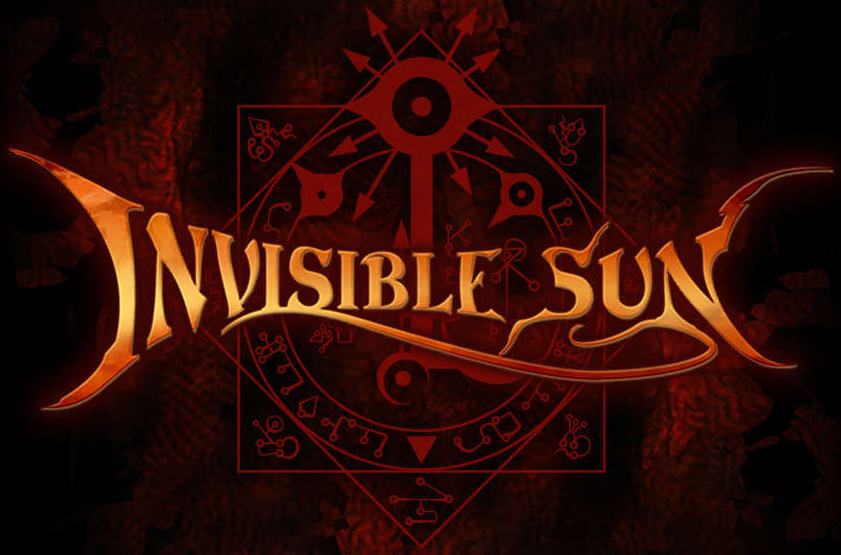
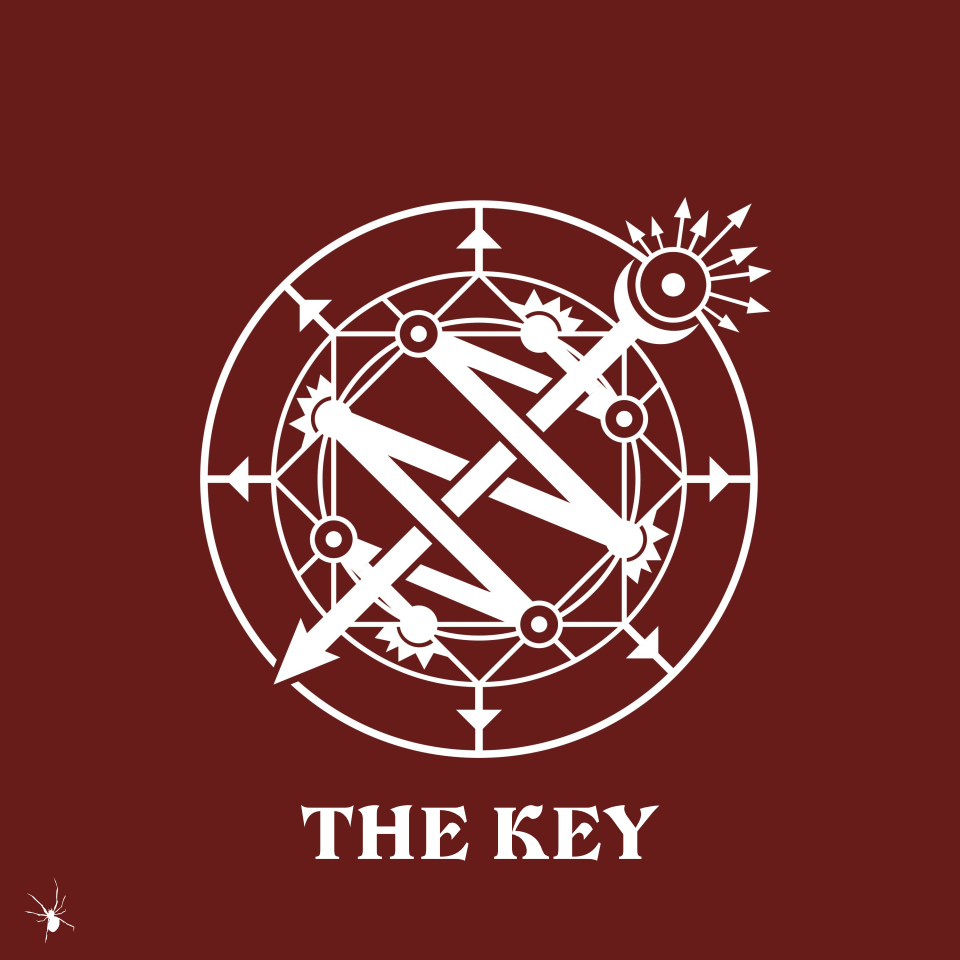
The Key is the recommended starting point, the first book to read. It has the rules for character creation, advancement, items, etc. It is also, just as incomprehensible as ever. There will be many many many quotes, screencaps, and even pages from this book. From all these books.
It is hard to just describe why Invisible Sun is bad. It’s the language it is written in, it is the layout of the books, the graphic design, the footnotes and organization and how every book refers to every other book constantly. It’s a nightmare.
The Alchemy of Lies and Truth
The first chapter of this book is 5 pages long. It is made up of 7 pieces of short RPG fiction. It is in two-column format with art interspersed. The text in this section is in… 3 different colors, blue, red, and indigo. I’m so tempted to include all of them, because all of them are so bad, so poorly written, the text full of incomprehensible lingo. But I know nobody wants me to copy over an entire chapter of fiction. So I’ll post the first so you can get a feel for the writing style, and just explain the rest in recaps as well as I can.
FORCED FREEDOM posted:
I first escaped Shadow three or four years ago. The Hendassa dragged me out, so I suppose it was less an escape and more like a rescue—or a harvest, depending on your opinion of the Hendasa
and their grey reapers.
At first, it was bewildering. I would say that it was like waking up from a dream, but that’s not really it. More like going to sleep and realizing that the dream is real and waking life was the dream. It took me quite a while to acclimate to Indigo. Or rather, re-acclimate. Just the whole . . . idea of it. Those were rough times. I really don’t like to talk or even think about those days. Some of the things that happened to me. Some of the things I did to survive. And, perhaps more important, to understand.
Like millions of others, I had submerged into Shadow to escape the War. But part of Shadow, of course, is the forgetting. That’s its nature. Officially, it’s called the Grey, and it is a place of distraction and nonsense. Endless meaninglessness and trivialities, always churning and turning in on itself. Always moving, but never going anywhere. In Shadow, I lived in a house, had a family, had a degree under my belt, and a job to earn money that passed through my hands and into the hands of others like a grinding wheel, all of us believing that amassing it was the ultimate goal, never realizing that doing so was impossible. I watched television and half paid attention to sports, politics, and culture, never recognizing that none of it made any sense, never went anywhere, never accomplished anything.
Once I re-acclimated, I never missed Shadow. Once I understood the Actuality, I never looked back.
I understand that sometimes people get dragged back into Shadow. I don’t know if what happens is more like a snare that grabs you or a siren’s call that lures you back. Maybe you suddenly remember your Shadow family or your Shadow lover or your Shadow car and it drags you back down into the Grey, seeping down and down like quicksand. Or maybe you just fall back into it all because you’ve always got a bit of Shadow’s essence in you now, wherever you go, and whatever you do. It knows where to find you. Whatever the case, it’s never happened to me. Not yet. I’ve spent the last few years entirely in Indigo.
Like most people, I found my place in the city of Satyrine. I’ve heard it called the City of Notions, the City of Forever, and the Glistening City. That last one is a stretch, but there are parts of the city—the Celestial Bazaar and the Marquis Quarter—that glisten,
I suppose. Maybe the whole place did, before the War. Now more of the city is a ruin than not. Although people are working to reclaim it, now that the War is over. I have only general memories of what Satyrine was like before the War, and before I exiled myself to the Grey. Shadow does that to you.
I was one of the fortunate ones, though. My house was still more or less intact. I had to work to get it in order, but I managed to get the grigs cleared out and chased away most of the ghosts. It’s still a little rough around the edges, but it’s home. There’s a familiarity to it—it’s an anchor when this weird and wonderful place gets to be too much. A sanctuary.
Most of the people I knew from before are gone. To be brutally honest, I barely remember them anyway. The time before the War, before the Grey, that’s like someone else’s life. But in the last few years, I’ve gotten to know my way around the city as it’s being rebuilt, and I’ve made some friends.
Take, for example, my neighbor. He tinkers with rhyming magic. He’s also got a 1966 Lamborghini Miura parked in front of his house. Which might seem a little out of place here. It’s very . . . showy. That’s his memento from Shadow. Remember, I said many of us have ties back to Shadow. A bit of Shadow that sticks. Well, some of them use that connection to reach in and pull out a memento. I’m not going to tell you what mine is. That’s personal.
Which reminds me, I’ve barely mentioned the biggest, probably most extraordinary part.
Magic.
Magic is real. Which, where I live now, is like saying, “gravity is real.” It’s a stupid thing to say. Although now that I think about it, I’m no longer certain about gravity. But I am certain about magic. There are energies that flow through the true worlds that can be harnessed to do all kinds of things. Although this can be expressed in many ways, most of those who work with magic in some fashion call ourselves vislae.
Those of us who exiled ourselves to Shadow are all vislae. That’s how we did it. We attuned ourselves to the Grey rather than to the rest of the Actuality. Shadow isn’t called that for nothing. In a real way, it is a shadow. It’s the shadow cast by the light of the Invisible Sun upon Indigo. Which is to say, it’s a twisted, distorted, and limited version of what is actually real. Just real enough to fool us. For years. In the Grey, I thought I was a nobody, but that was part of the illusion. I’m actually a vislae. I can practice magic. And I’m getting better.
So that’s what you need to know about me. I used to have a life in another place, but it wasn’t real. It was a life of illusion—a dull dream from which I finally escaped. The real world is a place we call the Actuality, and it’s wild and weird and filled with magic. At the heart of Indigo is the vast city of Satyrine, where ideas and emotions are more important than money or power (or rather, they are money and power). I have a home in this city, which is recovering from an unimaginable war fought with hate given material form and weapons built like creatures of personified destruction.
I have a thousand opportunities before me.
And I am you.
If all these Fantasy Words are confusing, congrats, that’s the Invisible Sun Experience! But to summarize the important bits: Our world, the “”””real”’” world is called Shadow or The Grey. It’s but one world in a big fancy multiverse of worlds, and it’s the lame boring sucky shitty one. Vislae is a stupid word for Wizards. The main Sigil ripoff city of the setting that most stuff happens in is Satyrine, which is in Indigo. The multiverse is rainbow-coded. There was a war, what that was about is Metaplot secrets. This feels like Planescape via World of Darkness. Get used to all of this.
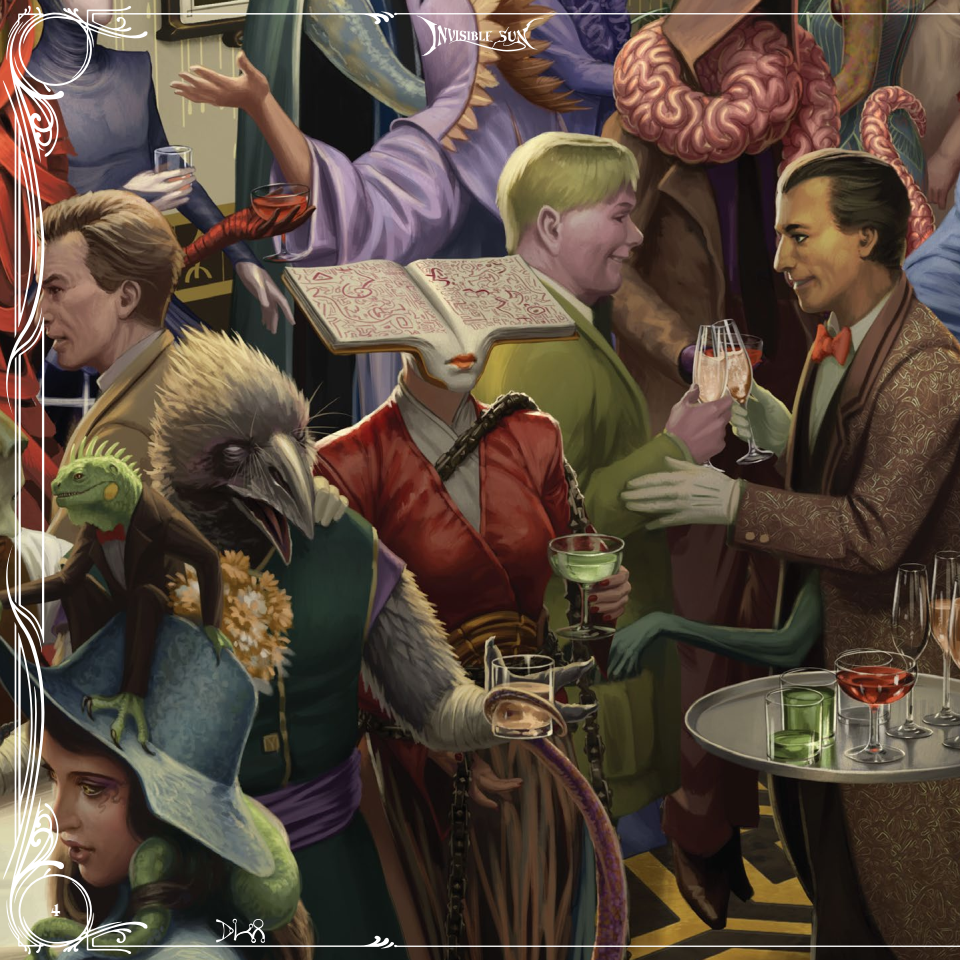
The next piece is called Angels on Street Corners. Dude sees a begging angel with words for wings begging for emotions in front of The Silent Church. Narrator goes home, meets his “elderbrin” friend who is a shapeshifter? Because he looks different today. Narrator’s house is filthy because the spirits that haunt his place haven’t “kept their end of the bargain” and he’s gonna curse them later. Narrator and friend eat dinner. Next day he sees another angel, who tries to talk and feathers come out of her mouth, and he keeps walking.
If this sounds like a wannabe Neil Gaiman, you are correct.
All A Dream Is identical in content to the first fiction, but this one is only 2 paragraphs and is more vaguely written and confusing. It doesn’t need to be here, but it is.
Mirrors Is a rant about how mirrors are an invasive virus, and mirrors are spreading when we don’t notice, and if enough mirrors reflect enough of the “real” world everything inverts and we’re the reflection now man! Narrator heard this theory from a “truespider” who heard it from a “maker”. Then it goes on to describe how the Maker once found God and turned him into a gun that was stolen by a Demon. But the mirrors ate him, and he vanished one day because he stopped looking. Or something?
A Mage At Arms is WAKE UP SHEEPLE but for wizards? Basically it introduces the idea that the multiverse is not really different universes (it is) but instead states of being (they aren’t, you literally travel between them) and to point out that Vislae can totally fight and be badass warrior types not just bookish spell nerds! (The game has an entire book about magic).
Apostate is… OK so it introduces a lady who is an Apostate, who is… not part of the “orders of magic”, so I guess an independent wizard? She does Spooky Research to summon a demon who has eyes “for she knew its pupils shone with a color otherwise unknown, anywhere” whatever that means. This helps her… take the next step down a path that would lead her to the “Labyrinth”.
The last one is Reacquainting Yourself With The World which is essentially a player guide to get into the mindset for the game. This is… also insufferable. Mostly it’s stuff about how things are DIFFERENT because MAGIC and WONDER. But also it emphasizes that Magical Interior Decorating is important. And it is important. Not kidding.
Next Time: Actual Character Creation, Layout Nightmares, Footnotes & Sidebars
(I farted this out to get started and have some Proper Content to argue about. Enjoy.)
The Key: Chapter 2: Characters
Original SA post
The Key: Chapter 2: Characters
Oh boy oh boy. I hope you guys are ready for this, because now we’re getting into the real shit.
So, player characters are Vislae, the fancy made up word for Wizards. It means “Children of Visla” which is the name of the Invisible Sun which… does something. It’s the source of magic I guess? Anyway, Vislae call non-vislae “Nons”. Yes, the game term for muggles/normals is “Nons”. As mentioned before, all Vislae exiled themselves to Shadow (THE REAL WORLD, OR IS IT???) to avoid the War (Secret Metaplot Bullshit) and have recently returned to their homes in Actuality (THE MAGICAL WORLD). They all have pseudo amnesia in that you only forgot the stuff that your GM should explain to you but you do remember how to do the stuff you don’t need them to tell you about.
So, now I’m going to digress a bit. I’ll be doing this a few times to point out something: This game has the worst goddamn layout I’ve ever seen in an RPG book. So first, whenever in the test the world Invisible appears… it’s in a light grey. On white.

Keywords? Light lavender. Also on white.

Oh and this is where we get introduced to the first kind of sidebar in this game. Yes the first kind, there are multiple types of sidebar notation.
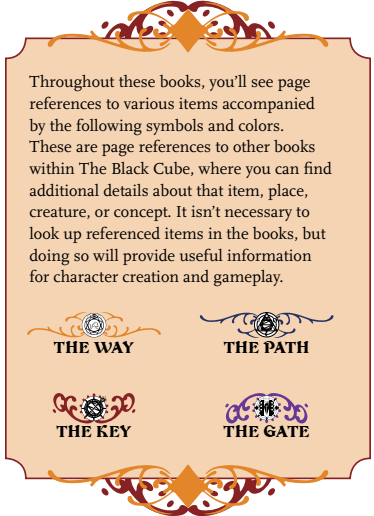
This first page? Page 11 alone?
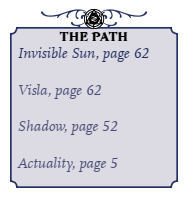
Yeah. Oh we aren’t done yet! See that’s 2 kinds of sidebars. The orange boxes are like extra rules clarifications that have to be in a box for some reason. The Other Book Reference Boxes are another, but there’s also Same book references.

Oh, and let’s not forget traditional explanatory sidebars.
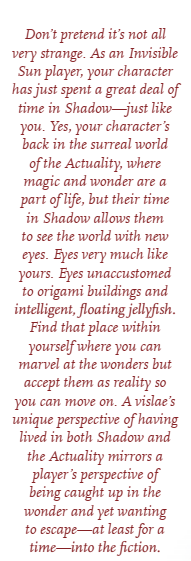
So yes that is 4 different kinds of notation in the sidebars, 2 of which look the same but are not.
But that’s not even the worst part! No no, because this book is 2 column layout. That’s normal right, 2 columns with a sidebar, nothing weird about that you say. No no, because the thing is… these things I’ve been calling sidebars? Aren’t sidebars.
They’re mid-bars.
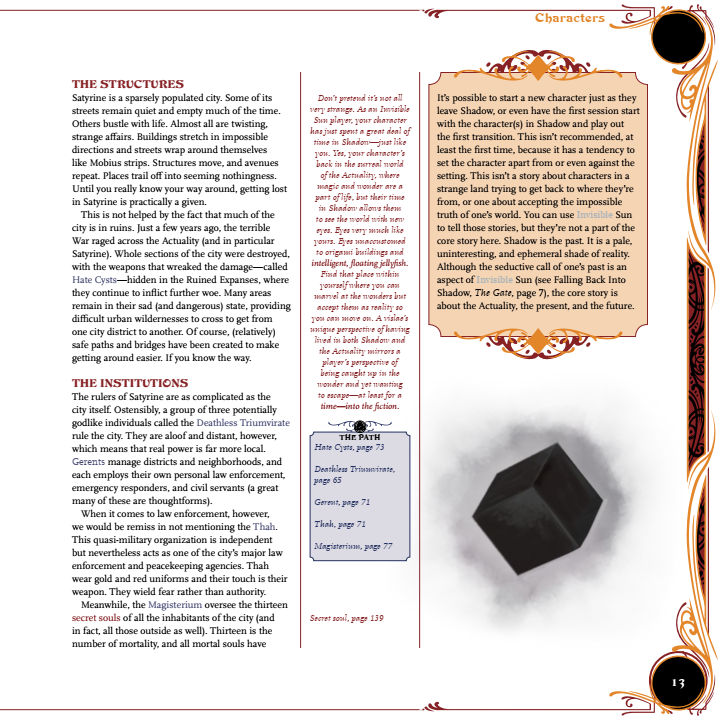
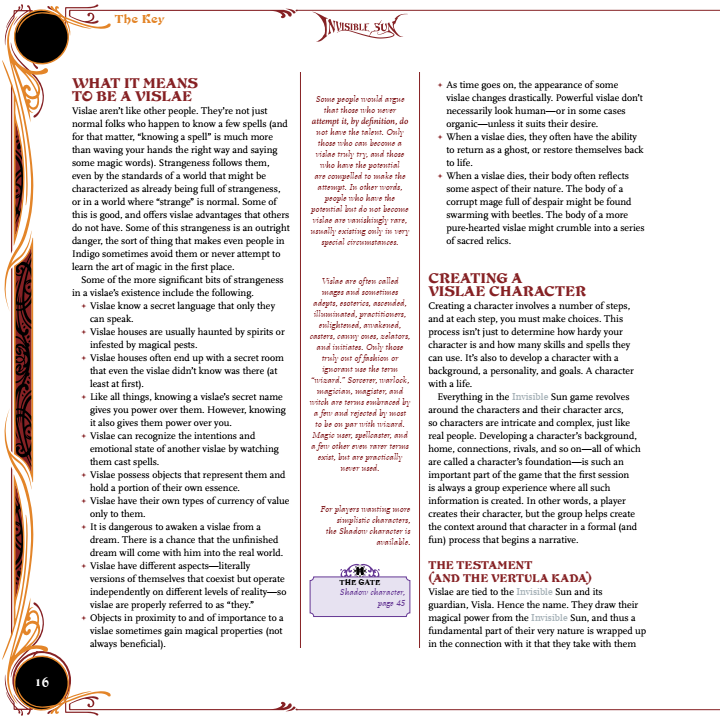
Layout and graphic designers, please feel free to tear your eyeballs out.
ANYWAY. So, back to character creation, which has issues. The main issue is that because Monte decided to split his book into non-contiguous sections which can be read in any order you get a lot, and I mean a LOT, of repetition. The same information is repeated over and over in different books because there’s no guarantee you’ll get the context before the content. So be aware I’ll be repeating a lot.
Anyway, so you’re Vislae, being a wizard has no correlation with your physical appearance or build so you can be a buff wizard unlike D&D. We learn that there’s places called changeries that are like magical plastic surgery so you can have
quote:
heads shaped like brass cubes, skin of sparkling
diamonds, eyes of green fre, a serpentine lower
body, legs like a spider, or stranger configurations
Your job as characters is vague and not-helpful. You are attempting to rebuild your life in Magictown that you abandoned. Invisible Sun flat out says that it will not tell you what to do, players have to come up with what this game is going to be about. This gives the illusion of freedom, but actually means that he just threw cool shit together without a unifying concept. We get another mention of The Labyrinth which has not been explained in this book, except it’s something that players want to do eventually.
The game assumes that you live in Satyrine, which is the magical city at the nexus of the multiverse sorta. It’s called the City of Notions, which is a dumb name. It’s wannabe Sigil, like I said before.
OK so besides Humans, which remember can look like non-humans thanks to magical plastic surgery, the most common denizen of Satyrine are the elderbrin. They are shapeshifters. Another are the Lacuna, who are… person shaped holes in the fabric of reality that act like living gateways to other places. There are also Thoughtforms and Shadows. Thoughtforms are semi-living beings created by magic out of thoughts and emotions to act as servants and such. They’re basically NPCs from a video game. Not actually a bad concept, I like. Shadows are people from… Shadow that interacted with a Vislae enough that they sort of got charged with magic and leveled up into being a Real Person. They are “Please see this other book for rules to play one” types so maybe when we get to the Gate!
Also there’s the Dead. Who normally live in the Pale, but do live in Satyrine as well.
OK so I’m switching to rambling list form for the rest of Facts About The Setting That Make Character Creation Vaguely Comprehensible.
- Satyrine is sparsely populated and there are massive stretches that are abandoned ruins from the war, and home to “Hate Cysts” that are a bad Thing I assume. This is basically an excuse for random encounters and dungeon crawling in what is ostensibly a populated city. Yay.
- The rulers of Satyrine are the Deathless Triumvirate *cough* LADY OF PAIN *cough* three godlike beings who are distant, aloof, and uninterested.
- Gerents are the name of the people that run districts and neighborhoods, have their own governments and civil service and law enforcement, etc. So we have a city organized like pseudo-feudalism because there isn’t a mention of democracy yet.
- The Thah, which is a fucking stupid name, are literally non-governmental quasi-military peacekeepers that enforce… someones laws? Via the mechanism of “their touch” whatever that means. They are explicitly fascists who rule by fear and I bet they aren’t going to be blatant antagonists.
- The Magisterium oversees… oh god… The thirteen secret souls of all inhabitants. Whatever that means. That’s all the info we got, everyone has 13 secret souls and something called the Magisterium oversees them.
- The Orders of Vislae are the Vance, Makers, Weavers, and Goetica and those are just the splats/classes/types of magic in the game. People who do magic and aren’t in an Order are Apostates.
- There are multiple suns that form the multiverse. They’re named after colors, each one has a concept and it’s own world and so on. Satyrine is in the Indigo Sun.
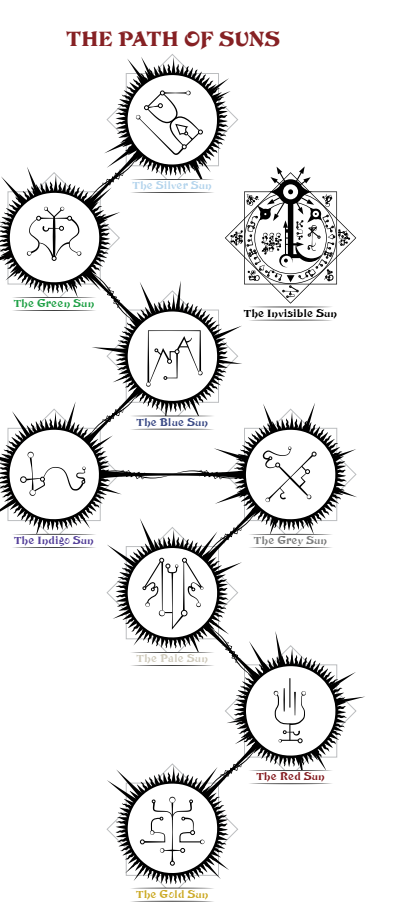
- The SIlent Church researches the Legacy, which is a fancy way of saying reality. It’s a collection of lore, items, creatures, etc. that point to the creator of reality which is also called The Legacy.
- Keyfalls are a thing, where keys rain from the skies. Some of those keys are wicked keys, which can bypass “anything: not just doors, but people, problems, or situations.”
- The Noösphere is the collective unconscious basically, an alternate reality made up of the thoughts of all living things.
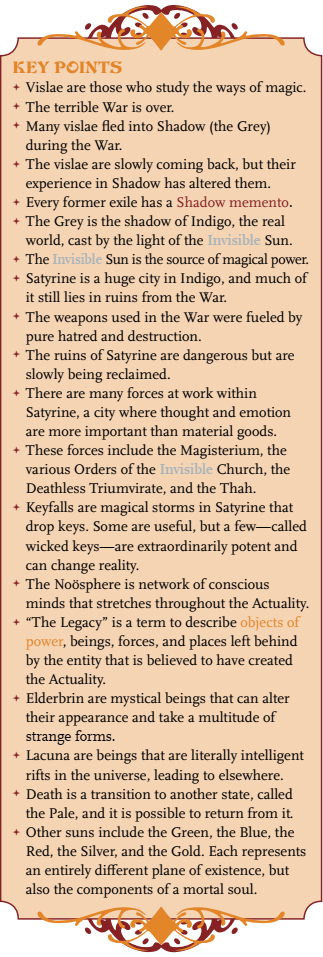
And welp I could have just copy-pasted that thing so fuck me I guess. Whatever. You’ll notice that there is a lot of words and information that means basically nothing at all. Like it mentions the Magisterium but you don’t know what the hell it IS. What was the war? Who knows! What actually are wicked keys? Guess! It’s all evocative and weird and vague and nonsense completely.
Finally before we get to the actual mechanics of making a character, or at least the bits of choosing things about them, we learn some more stuff that make vislae special!
quote:
- Vislae know a secret language that only they can speak.
- Vislae houses are usually haunted by spirits or infested by magical pests.
- Vislae houses often end up with a secret room that even the vislae didn’t know was there (at least at first).
- Like all things, knowing a vislae’s secret name gives you power over them. However, knowing it also gives them power over you.
- Vislae can recognize the intentions and emotional state of another vislae by watching them cast spells.
- Vislae possess objects that represent them and hold a portion of their own essence.
- Vislae have their own types of currency of value only to them.
- It is dangerous to awaken a vislae from a dream. There is a chance that the unfinished dream will come with him into the real world.
- Vislae have different aspects—literally versions of themselves that coexist but operate independently on different levels of reality—so vislae are properly referred to as “they.”
- Objects in proximity to and of importance to a vislae sometimes gain magical properties (not always beneficial)
- As time goes on, the appearance of some vislae changes drastically. Powerful vislae don’t necessarily look human—or in some cases organic—unless it suits their desire.
- When a vislae dies, they often have the ability to return as a ghost, or restore themselves back to life.
- When a vislae dies, their body often reflects some aspect of their nature. The body of a corrupt mage full of despair might be found swarming with beetles. The body of a more pure-hearted vislae might crumble into a series of sacred relics.
I really don’t have much to say, this is all just… so evocatively hollow. I mean the secret language is cool, I’m OK with that, some of the other stuff is neat. The dream thing seems like it exists just to have the GM fuck you with dream-monsters, the whole multiple-aspects sounds like it is either pointless or a giant pain in the ass during play, and goddamn I’m sick of reading Vislae. It’s a terrible word.
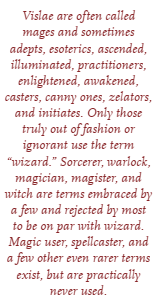
Next Time: Actual Fucking Character Creation, The Buttplug of Apostasy, and the Big Plastic Hand of Magic
Creating a Vislae Character
Original SA post
Creating a Vislae Character
quote:
Creating a character involves a number of steps,
and at each step, you must make choices. This
process isn’t just to determine how hardy your
character is and how many skills and spells they
can use. It’s also to develop a character with a
background, a personality, and goals. A character
with a life.
Everything in the Invisible Sun game revolves
around the characters and their character arcs,
so characters are intricate and complex, just like
real people. Developing a character’s background,
home, connections, rivals, and so on—all of which
are called a character’s foundation—is such an
important part of the game that the first session
is always a group experience where all such
information is created. In other words, a player
creates their character, but the group helps create
the context around that character in a formal (and
fun) process that begins a narrative
I wanted to post that because… god, does this game not do that. I hope I can transmit just how bloated and awkward this entire process is. Oh wait, I know I can, because before we get to any rules we get to learn about The Testament and the Vertula Kada! God damn this is stupid.
Ok so, all Vislae who are part of an Order carry with them The Testament of Suns, which is a symbolic representation of their connection to the Invisible Sun and describes a Vislae’s individual nature.
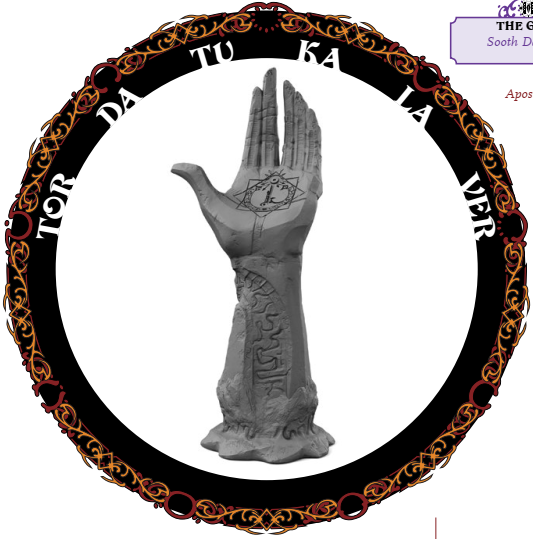
Yes, it is in fact that stupid plastic hand that’s in the box. Why is there a plastic hand in the box? It holds cards. Like, it literally is for displaying cards. We’ll get to that nonsense later though.
So, just assume all wizards are carrying this… hand statue around with them. I guess? There’s no indication that it can be any other representation of a 6 fingered hand, so I guess you just have an awkward statue in your pocket at all times.
Each finger represents an aspect of your character:
TOR… Order!
DA… Heart!
TU… Forte!
KA… Soul!
LA… Foundation!
VER… Art!
Apostates, not belonging to an Order, do not use this. Instead they use the Vertula Kada…
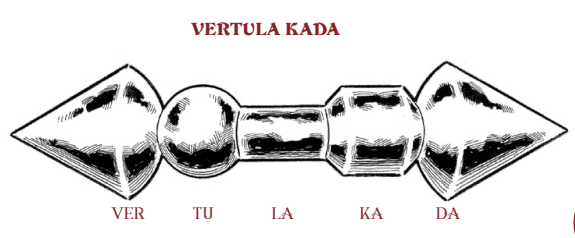
Because Monte Cook didn’t learn from Sword of Truth not to make your magical items look like sex toys.
Anyway, this all is a completely pointless excuse to make the fact that you have a Cypher Sentence to make.
quote:
Once character creation is complete, each vislae can
be described in a sentence: “I am a blank blank of the
Order of blank who blanks.” Four of the character’s
aspects determine the parts of that sentence. So a
character is a [FOUNDATION] [HEART] of the Order
of [ORDER] who [FORTE].
If you’ve ever played or read a Cypher System game, you know this already.
So, because the testament of suns has 6 fingers, you make the character in 8 steps! Yeah, that actually is a thing:
quote:
With the Testament in mind, you create a vislae in six
steps, listed below. Some of the steps are simple, and
others are involved. All exist so that you can develop
a deep and dynamic character. Six is the number of
death and is generally regarded as ill-favored, so we
shall include a seventh step, which involves the bonds
a character has with their closest friends. But seven is
the number of change and transition, and eight is the
number of rebirth and new beginnings (and in so many
ways, vislae returning from Shadow are, in a very real
sense, experiencing rebirth). So there are, in fact,
eight steps to character creation that we will number 0
through 7. (0 is numbered as such because it is optional
and exists outside the aspects of a character, dealing
more with the player.)
You can do steps 0 through 4 on your own,
although doing them in conjunction with the game
master (GM) is not a bad idea. Steps 5 through 7
should be done in conjunction with the other players,
and will likely be handled when you get together for
the first session of the game. Steps 1 through 7 all
have their own dedicated chapters in this tome to
help guide you through the choices involved.
Step 0: Choose a roleplaying style.
Step 1: Choose an order.
Step 2: Choose a heart.
Step 3: Choose a forte.
Step 4: Choose a soul.
Step 5: Build a foundation.
Step 6: Choose a character arc.
Step 7: Create bonds and an initial group
desideratum.
I wanted to include that in full because, god fucking damn why did you feel the need to justify the number of steps in character creation using LORE.
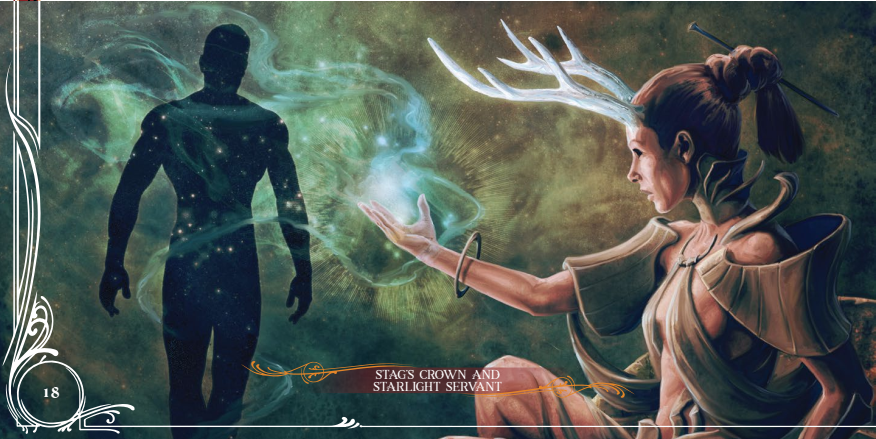
OK so let’s go through these. So, Step 0? Yeah it’s not actually a step. No no, it’s… it’s… it’s just fucking GNS theory. Step 0 is you pick if you’re a Builder, Explorer, Attainer or Achiever! This signals to the GM what kind of game you’re interested in! The game is designed to hit all four kinds of player though, and in fact I have no idea how you would play this and not include them. Oh, each one is literally just: Do you want to make and change stuff in the setting? Do you want to see knew stuff and learn about the setting? Do you want to get more stuff and level up? Do you want to play out stories? It’s GNS with a new coat of paint, everyone knows it, moving on.
Step 1: Choose an Order
This is actually the real start of making a character. Orders are, in essence, your splats, your classes, they are your main mechanical THING. They are also terrible, but, the exact reasons why Orders are fucking bullshit will have to wait until the Magic Book. Let’s just say now that every one has a completely unique magic system. The Orders are: the Vance, The Weavers, The Makers, the Goetics, and the Apostates are their own thing. Want to know more detail? Too bad, those are in another chapter on their own. We’ll get to them when I get to the Orders chapter which is after the Character Creation Rules. That’s true for every one of these steps.
Step 2: Choose a Heart
I actually had to skip ahead to understand what this was because it’s so vague. Your “heart” is your essence, according to the game. What it actually is, is a vague personality type, and your starting stat and skills. It’s literally just you picking a stat array and what your beginner skills are, there are four: Galants, Stoics, Empaths, and Ardents.
Step 3: Choose a Forte
OK these are your class independent special abilities. They’re in every Cypher system game, Numenera calls them Verbs, whatever. It’s a dumb descriptive phrase like “Fuses Nightmare to Fist” or “Channesl Strength and Skill” which sounds evocative but is basically a prestige class sorta thing with a lot of mechanics stuffed in.
Step 4: Choose a Soul
Right so, every Vislae have an allegience to one of 13 Secret Souls governed by the Magisterium, and each has a Soul Guardian that a vislae can call upon for a price. What does this mean? FUCK if I know. But looking ahead… oh my god. OK so, this is just your Star Sign from an Elder Scrolls game. Not even joking, it is LITERALLY the same as picking your star sign in Elder Scrolls. Goddamn. It’s basically your Zodiac Sign, you get an evocative name, some personality traits common to that Soul you pick, and each one comes with a minor and situational special ability.
Step 5: Build a Foundation
Right so this… this is more of the “OK time to fill out all the rest of the sheet!” step that every game has, where you fill out name and such.
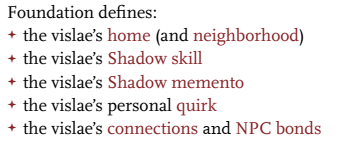
I have no idea if this has hard mechanics behind it, but I’m guessing so because goddamn does Monte love sticking hard math behind everything.
Step 6: Choose a Character Arc
So this ties into the advancement mechanics. Which… I’ll explain when we get to that part. But as far as I can tell (I know more than I’m saying, but I’m pretending I don’t for entertainment purposes, shush, it’s theatere) it’s a sort of “Make a goal for yourself, do the goal and get XP” system. Oh, but of course, it’s not called XP, it’s called “Acumen and Crux” which…in a bit. Later on down this post.
Step 7: Form Bonds
Right class! Everyone partner up and write a little story about why you like the other person! You know how this works, it’s Bonds from Dungeon World or any number of other systems. You write down a relationship you have with at least one other PC, binds the group together, etcetera.
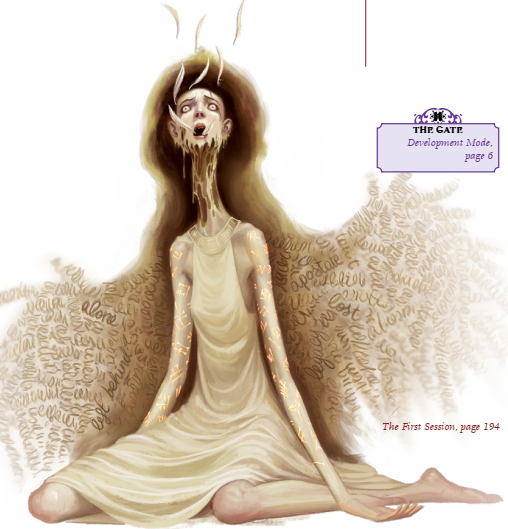
Character Creation Concepts
OK so… this is a clear example of how fucking terrible the idea to split the game up into four+ disconnected books is. See, you can’t really make decisions about making a character without knowing the system, but the system is a completely separate book, so have some vague cliffs notes explanations of the mechanics now so you aren’t totally lost. I am going to faithfully transmit this information, and if you get really confused congrats! That’s the intended experience, I’m not helping you out with More Information, because Monte Cook doesn’t think you deserve it.
Acumen and Crux
These are… sorta XP? You get them for doing stuff and for experiencing things. Crux are divided into Joy and Despair, and one of each equals one Crux. You get Joy and Despair, and therefore Crux, when good and bad things happen to you. Gotta have good AND bad things happen. Acumen you get… well it doesn't say. Crux increases your Order and Forte, while Acumen is spells, secrets, and skills. No, you don’t get to know more, that’s all that’s here, wait till later!
Venture and Challenge
When you try to do something, the GM assigns it a challenge, from 0 to 10+. Not, “if you do something risky”, if you do anything.
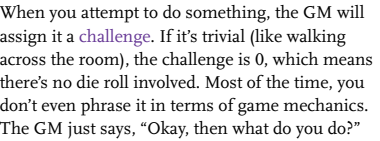
“Gotta engage with the mechanics!”
Anyway, challenge is how hard something is to do. The player puts forth a venture, which is the total amount by which you modify the action. Subtract Venture from Challenge. If your Venture would lower Challenge to 0 you don’t have to roll. If the result is 1 or higher, that’s what you need to roll on your die to succeed. No, I don’t know yet (in this context of me pretending not to know shit) what die you roll.
Spells Are magical workings. They have levels, high spell level=more powerful spell. TO cast spells spend it’s level in points from your Sorcery stat pool (nope, no idea what that is yet). Spells are not the only kind of magic, there are also cantrips, charms, signs, hexes, enchantments, rituals, and invocations. Nope, no idea what the difference between all those are, but boy that’s a lot of Stuff!
Secrets
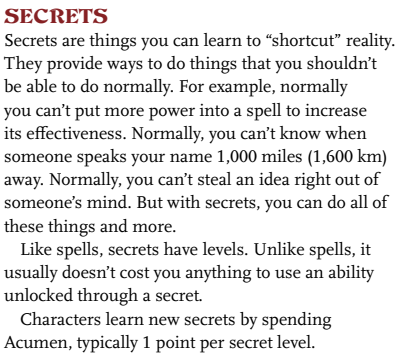
I’m just posting this so you can see how useless this is. I’m assuming Secrets are the catch all for special abilities that don’t fit anywhere else. Or they may just be fucking Feats again, who knows.
Damage
Damage is inflicted in Injuries. When you get 3 Injuries (3 points of Damage) they become a Wound or an Anguish, depending on if physical or mental Injuries. If you get 3 Wounds or Anguish you die. I have no idea how bad this is, but it feels like this game could get very Rocket-Tagg-y with these sorts of numbers.
Ephemera and Objects of Power
It’s Magic Items/Cyphers/Numenera/Whatevers. Ephemera are one-shot, Objects of Power have multiple uses or are permanent, you are limited in how many you can carry, rules are in another book, fuck you.
Sooth Deck
Oh god this fucking thing. This is one of the most stupid, pain in the ass, penny pinching, fucking nickel and dime busywork bullshit system’s I’ve ever seen in an RPG. Fuck sooth cards, goddamn. OK these dont’ get really explained until Another Book ™ But they’re basically shitty Tarot Cards that give bonuses and penalties to magic.
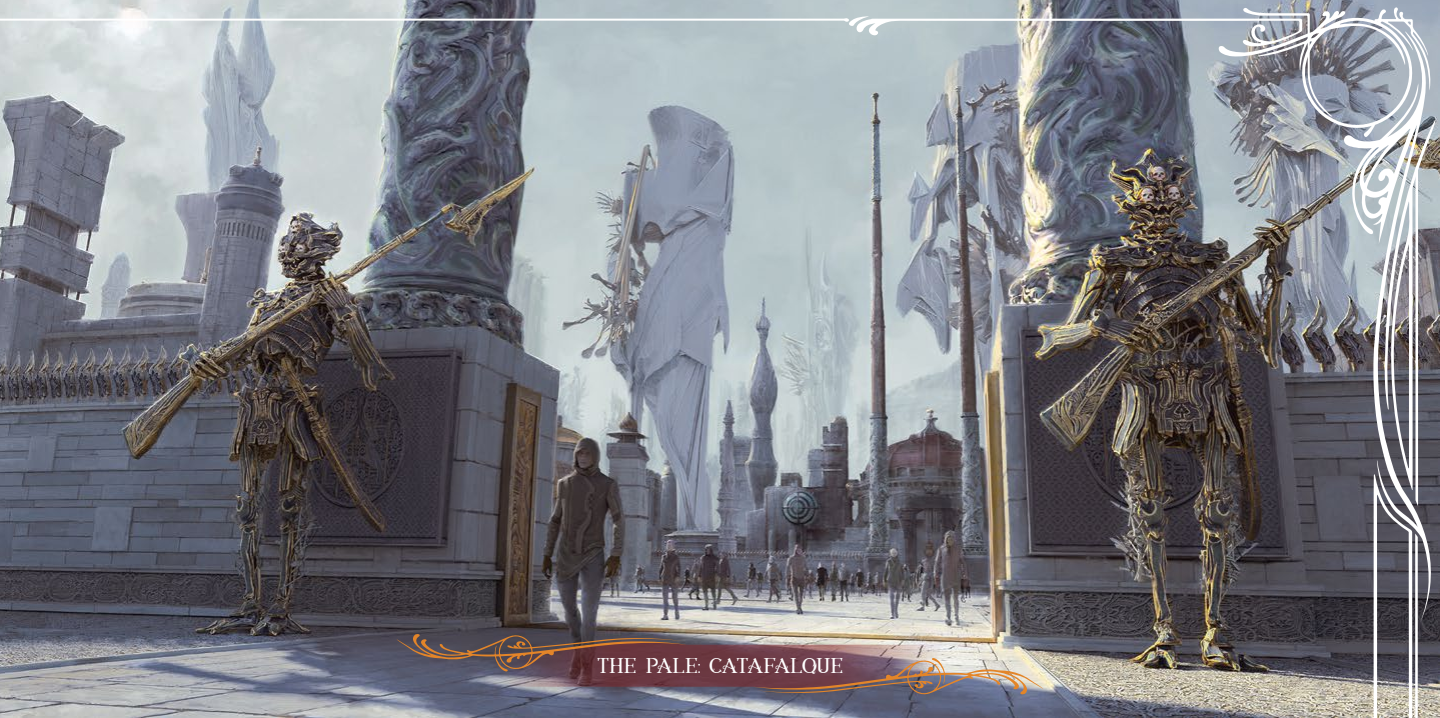
That’s it for character creation! Most of the rest of this is explaining the options more. Yes, I am going over them, no you don’t get to learn the system any, fuck you says Monte Cook! This is the Recommended Reading Order!
Next Time: Cortez and Quaaludes, Bene Gesserit, and Pool Parties
Statistics and Skills
Original SA post
Statistics and Skills

This is the first quote in the book, and no I have NO idea why it’s in the chapter well they tell us what the stats do.
I hope you’re all ready for… some fun things. Mainly New Special Vocabulary for everything.
Statistics
Right so, this game has… three stats. Sorta. Actually two, or maybe eight, or… it’s confusing. So I’ll try and make this make sense, there will be a lot of “Except” in this chapter.
So we have two main stats: Certe and Qualia. Why those names? I don’t know at all, because you can literally just say Physical and Mental, because that’s what they mean. Certes is the physical stuff, Qualia is mental and magical stuff. Did you guess that Qualia is more important and useful to have? Because it is. Hooray!
So, each stat has as score, of “8-10” as average. That score is divided up into stat pools. For Certe that is Accuracy, Movement, Physicality, and Perception. For Qualia those are Sorcery, Interaction, Intellect, and Sortilege.
The points in the pool are called bene. The value in a pool is now many bene points you have whenever they refresh. Bene are not tracked for Sortilege, which is measured in enhancements, which can be used with any action. What does that mean? Don’t know yet.
Bene is a fancy way to say +1. Literally, it’s just a +1. Spend a bene from your pool, get a +1 in that stat pool action thingy. An enhancement also adds +1 die to the roll for the action. Bene is a +1 to the venture, enhancement is +1 die for the rolling.
Yes these names are making it hard to coherently write this.
Anyway the stat pools are mostly self-explanatory, except they aren’t! This is Monte Cook! He never saw a mechanic he couldn’t cram special case rules into!
- Accuracy: This is the pool for hitting someone with an attack, that is physical in nature. Like the attack can be magic, but it has to be physical, so like… mind blasts and hexes don’t count. Only damage to their corporeal meat body. But, it also has the special function that bene can be spent to increase the damage of an attack by +2. I think from the writing this is an either/or choice: Bene give +1 to the ventur, or +2 to damage but not both but I’m also not sure because it isn’t explicit.
- Movement: Ok so this is easy right? Physical movement. Run, jump, swim, balance, also used for dodging attacks. All fine, atheltics-y stuff, makes sense. Oh no it’s also used for… hiding. And lockpicking. And crafting. All under Movement. So it’s really Agility or Dexterity in other RPGs but Cook wanted to be different so now you have to remember that when you’re making a chair, that’s a Movement action that is.
- Physicality: It’s strength/endurance. Lift gates, bend bars, resist poison and disease and you know how this works. You can spend bene from this pool to negate 1 Wound, and can spend multiple at a time. So this is basically your HP, but confusing and overcomplicated. Oh you can also spend a Physicality bene to negate an Injury at any time, even after. Wounds you gotta spend when you get them, but Injuries can just be… regrown or whatever. So remember that Physicality is also HP and therefore only a fucking moron would ever spend a bene from this for a measly +1 when it could be the difference between you living and dying and WHY DO YOU KEEP DOING THIS SHIT MONTE. HP AND STATS BEING THE SAME DAMN THING IS A BAD IDEA YOU FUCKING DONKEY.
- Perception: It’s perception, literally nothing special you roll it to sense stuff.
- Sorcery: It’s your spellcasting stat, it’s your hexes, rituals, forte, order… it’s literally everything that you use magic with. It’s all magic. Magic is this. Bene here is spent to cast any spells at all, spend bene equal to the spell level, and you can spend additional multiple bene to bump up the venture. Also spell level IS the venture, so yeah, this is The Most Important Stat because it fuels literally the most important aspects of your character Monte you fucking moron stop making godstats, IT'S OBVIOUSLY A GODSTAT YOU TIT.
- Interaction: It’s fucking charisma, moving on.
- Intellect: It’s Intelligence. Also willpower. It’s like Physicality for your brainmeats. Spend a bene to negate Anguish as it is suffered, or can be spent to negate an injury at any time it works just like fucking physicality ok? Oh, nice fact, there is no indication if Injuries are tracked by damage source. So I guess this is also anti-Physical injury as well?
- Sortilege: OK so this doesn’t affect venture. Spend pool points here for enhancements. This is an additional die ona roll, and you can use these on any roll for yourself, or give them to people within line of sight as well. You can’t use this if anything already has additional dice, and it’s 1 action unless you get a secret (AKA a Feat, it’s goddamn feats shit).
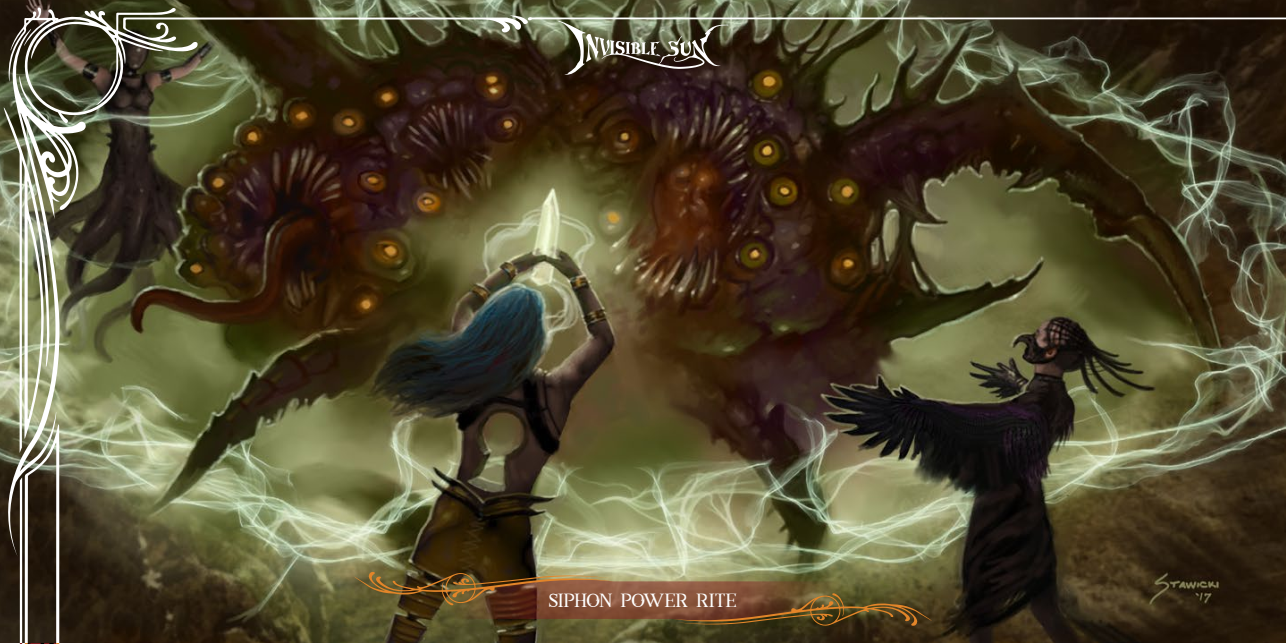
Vexes and Scourges
OK so these are anti-bene. Vexes are a -1 to the venture, GM applies them, no idea how you get them. Apparently something called Kindled Items are a way, but that’s on page 183, we’re on 31. Yeah, forget that. Anyway, Scourges work like vexes except instead of one roll, they stick around and are a semi-permanent -1 to your Venture for any rolls using a specific pool. It has to be gotten rid of somehow, probably through GM Fiat.
Resting
Oh god. OK so characters can refresh one, 1, ONE, singular pool by resting. You can rest up to four times a day. The first two are short rests that take an action, for the next is a long rest of ten minutes, and then it’s an hour rest. You can use any of these rests in any order. Your pools all refill with a D&*D style long rest for the next day. Or when the GM says they do. You can use the ten minute or one hour rests to heal a Wound or Anguish instead of refresh a pool. You can also use them to do other shit, like end ongoing effects, poisons, diseases, curses, etc. So you not only have D&D style Adventuring Day you have 4 other short rests, of 3 different durations, that you have to track as well, and they are tied not to session but to in-game time. Yay, more and more piddly annoying bookkeeping!
Hidden Knowledge
This is that third stat that isn’t a stat, but it is a stat. Yeah. Anyway this is… stuff you know. Gossip, facts, education, secrets, lore, etc. etc. Spend a point from Hidden Knowledge to get a bene on any roll that… you can convince the GM fits because You Know A Thing. Only one use at a time, but it can be combined with bene from other pools.
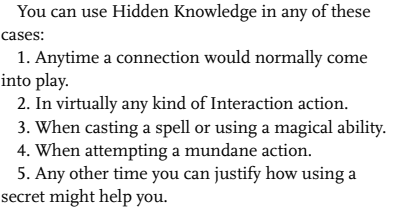
It’s just GM May I Have A Bene?
Oh goody, it also doesn’t refresh. Not automatically, no you need to get back Hidden Knowledge by research, learning stuff, listening to gossip, etc. It is totally GM dependent, and the book even says that GM’s should use it as a reward. So gaining it back is also completely dependent on the GM. yay.
Skills
It’s skills, you know what this shit does. If you have a skill it’s level 1 through 4, add +1 to your venture per level of skill, they combine with bene and so on. I’m not listing shit, it’s skills, you know how they work, there’s a lot of suggested ones but this is one of those games where they give you dozens of useless examples and say “Make up your own!”
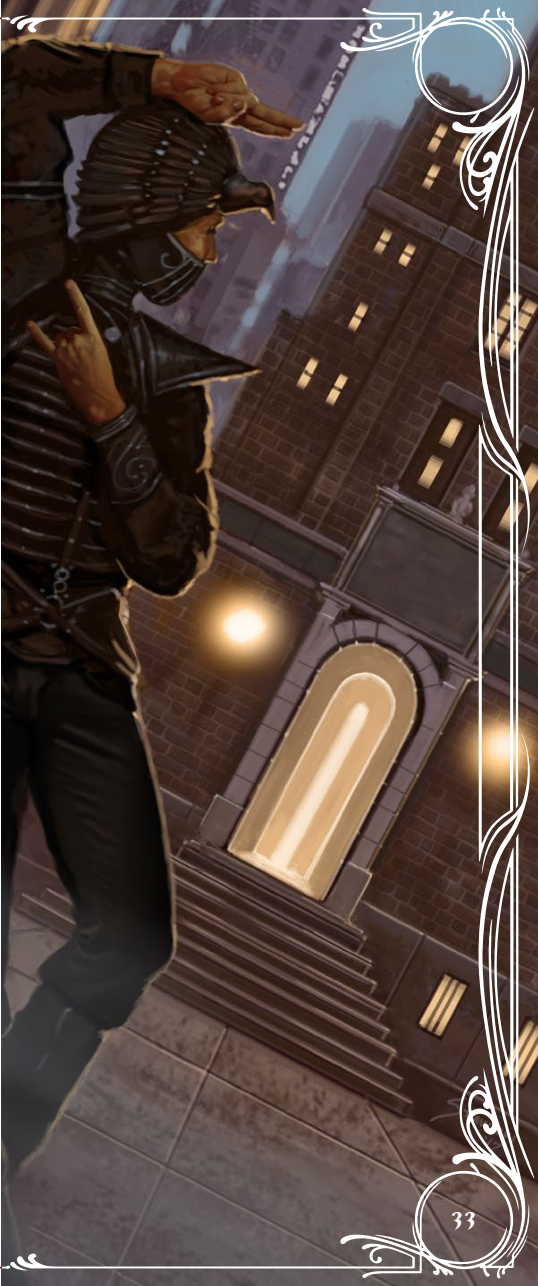
Next time: Orders, 3d Renders, Nightmares, See Other Book
ORDER (TOR)
Original SA post
ORDER (TOR)
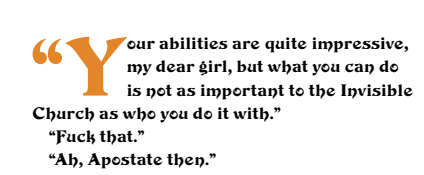
Welcome to hell. This chapter is a nightmare because I’m going to try and explain the classes and magic systems without also just doing an entire breakdown of the Magic Book. This is going to be a fucking mess.
quote:
All vislae are members of the Invisible Church,
a term with a great deal of gravity but not much
actual meaning. The Invisible Church is not an
actual church or organization. It’s not . . . anything,
really, other than a way to refer to all vislae together.
The term makes it sound like all vislae belong to
a single society, which is incorrect.

Vance
So Vances are the closest to your traditional D&D wizard, and yes, their name is taken from Vancian spellcasting. Now, there is one little problem with that: Vancian Spellcasting is called that because it is how magic works in the Dying Earth novels by Jack Vance. A real world author. So, why is a brotherhood of interdimensional wizards centuries old named after a pulp fantasy writer from 20th Century Earth? Or are they saying that Jack Vance was a Vance or something and so he’s named after the Order? Or did the order have no name until some Vislae came back from shadow and was like “Hey guys! I read some RAD BOOKS!”?
Anyway, so: Vances are hierarchical. They are ran by the Telemeric Court, a council of nine 6th Degree Vances, which meet yearly in Satyrine. They are the masters of “spells”, as in formulaic set magical effects, which act like almost living things. Vances are all about finding and learning new spells.
So, how does Vancian casting work? Because if you thought “sanely” or “like D&D” you’re wrong! It works in one of the dumbest possible ways I’ve ever seen a magic system work. So Vances have to memorize spells like a D&D wizard: they sit down with a spellbook and read the spells they want and “absorb” them into their mind, and they can then later be cast. Except while sane games would give you spell slots this game… well...
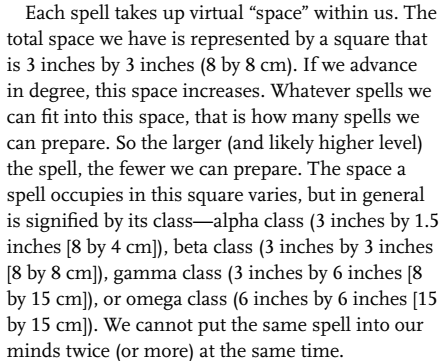
Yeah. Let me clarify: To pick your spells you get… spell cards.
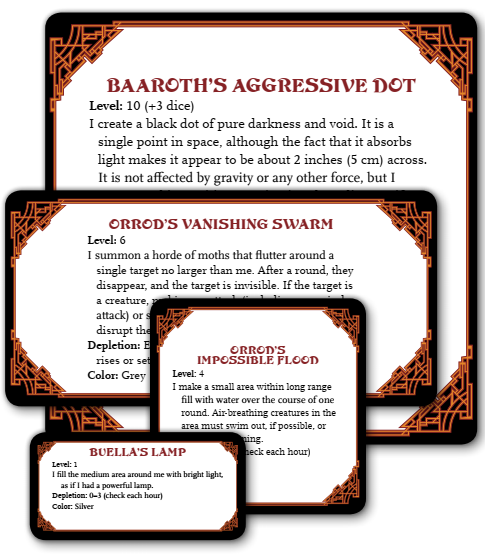
Like that. With the size determined by spell level. THen you literally put those rectangular cards onto:
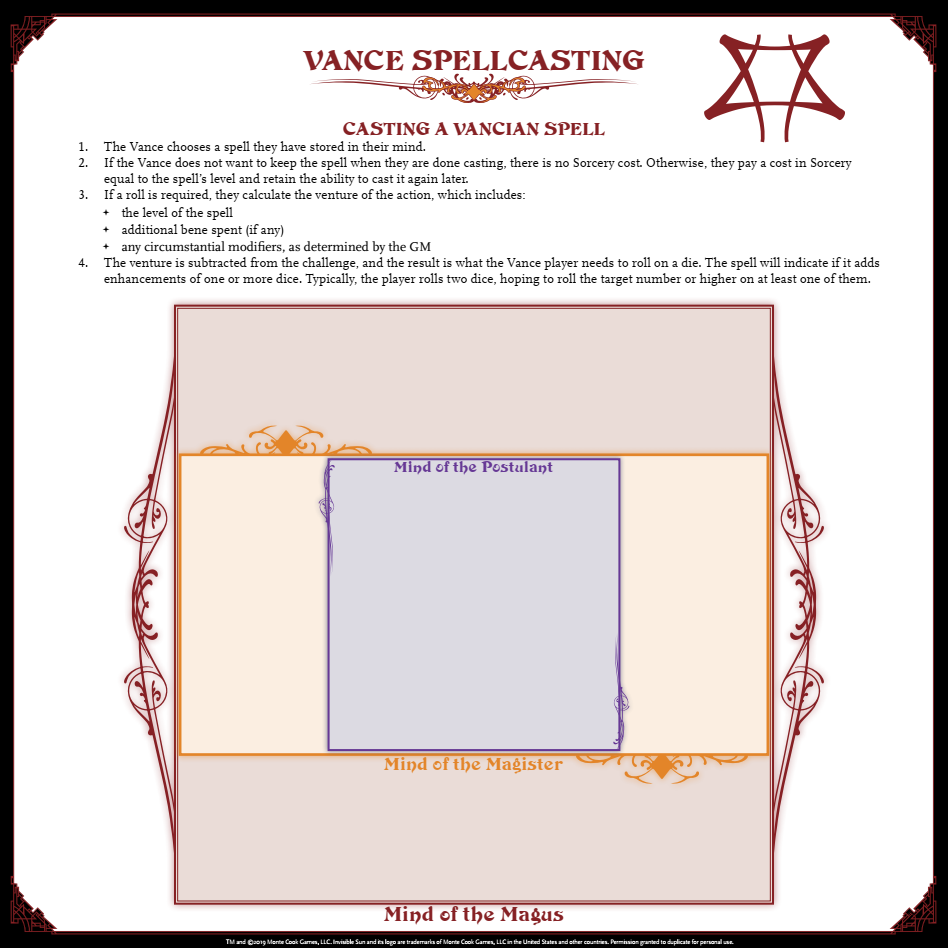
Each square is one “tier” of vance. You have to fit your cards on there without overlapping. There is no tetris style strategy, every card is just a rectangle. Oh, and guess what? These cards? You’re expected to fold them in half. Later Vancian degrees let you half the size of a spell so you can fit more onto your spell-page. You literally have to fold them in half for this to make any sense. This means two things: 1, you literally HAVE to make spell cards for every spell, and hope that the fancy ones that came with the physical box aren’t ruined in minutes and 2. This game is a nightmare to try and play online. Like, it basically doesn’t work online just because of this single system. Goddammit this is the worst casting system I’ve ever seen. I can see what they were going for, but this execution is straight up dogshit.
Anyway, the Degree benefits are all boring and i’m not going into detail. Each type you have to do some in-game questy activity, like inventing a new spell or similar. All the bonuses are essentially that you can carry more magic items, you get more spell-space, and you can boss around more members of the Order.
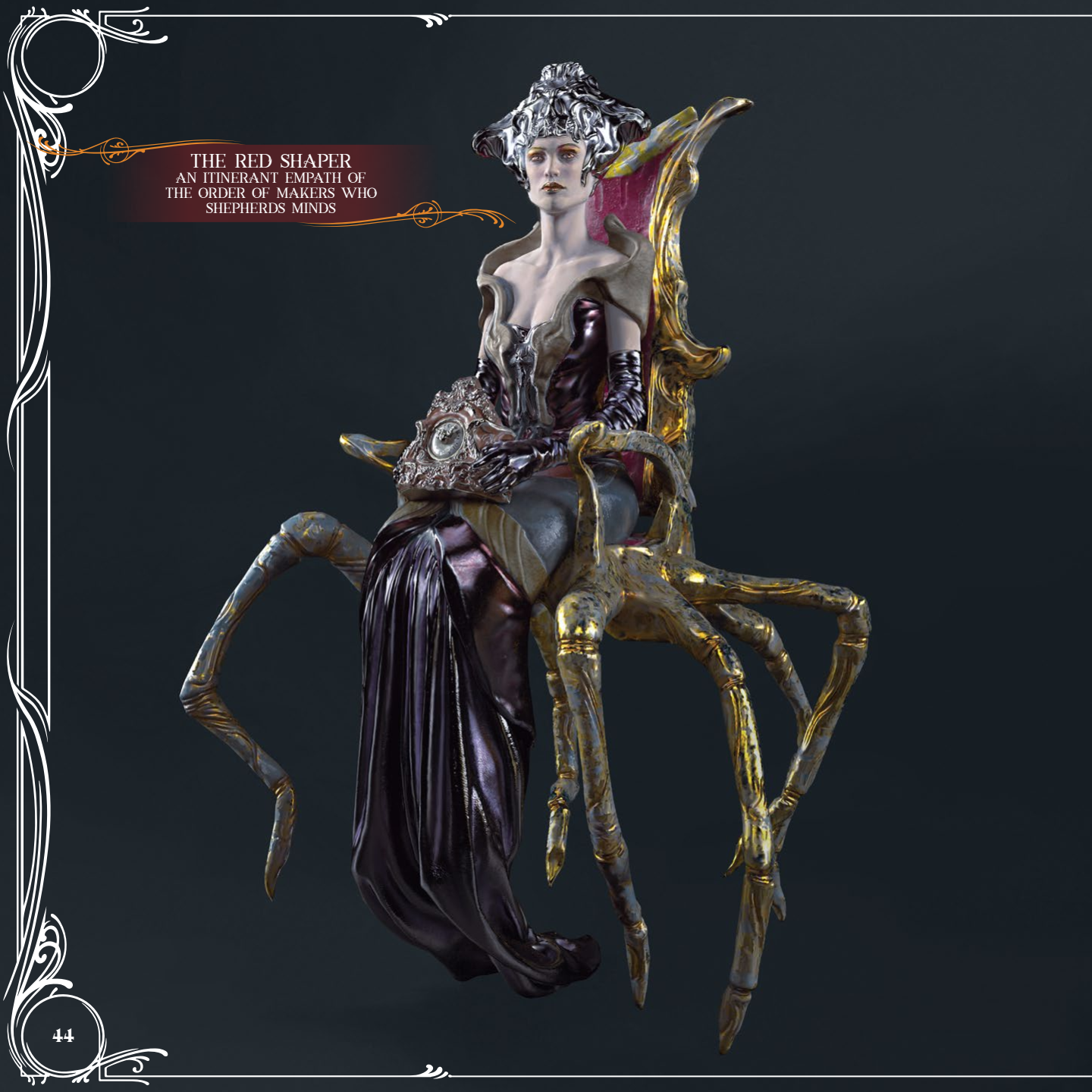
Makers
So, Makers make magic items. Like, that’s it. They craft magic items to use. You find crafting mats, and make magical items. Makers are also giant assholes:
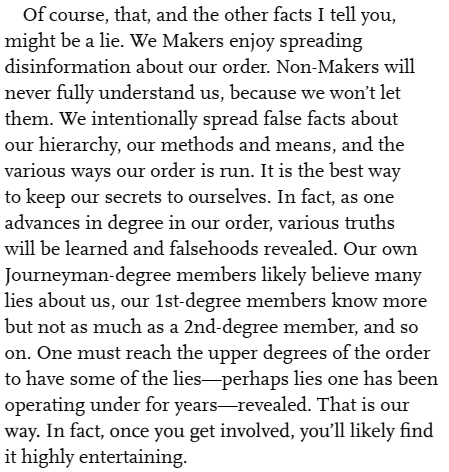
So, Makers are, on paper if you don’t read the rules for their actual magic, pretty cool. Mostly it’s your general improvments to making magical items, higher level items allowed, make them faster, etc. One neat feature that actually is cool is that every Maker gets a single signature magic item that they always have, works only for them, and they can re-make easily if it’s ever lost or destroyed. Every degree you get to add more special abilities to this magical object. These special abilities are actually cool! They can give you armor, give big dice bonuses, act like a weapon, move on their own through the air at your command, become intelligent, and even shapeshift and transform. It’s actually cool. Sadly, Makers are also fucking terrible because of their main gimmick.
See, making magic items sucks, and it’s easy to understand why. Because to make them, you use the Makers Matrix:
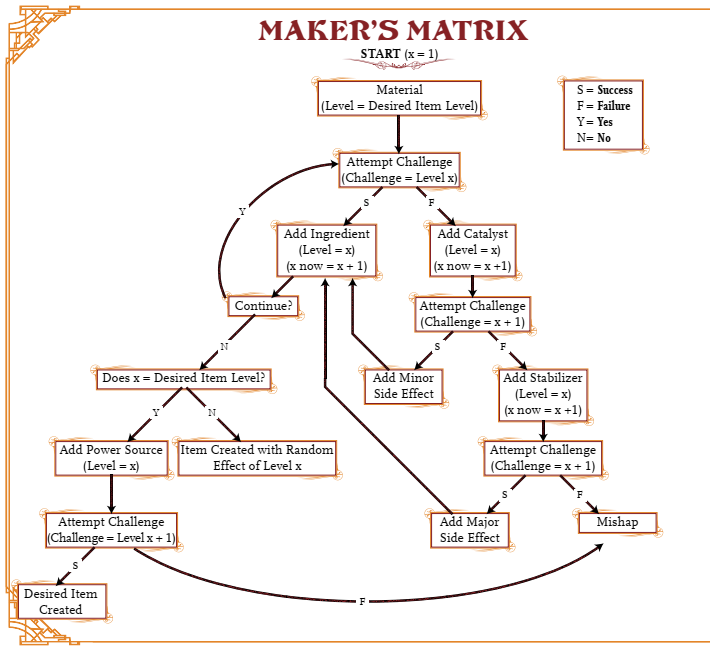
Do I really have to explain? Well I will, but it’ll be when we get to the magic book, but suffice to say: You can see the Issues.
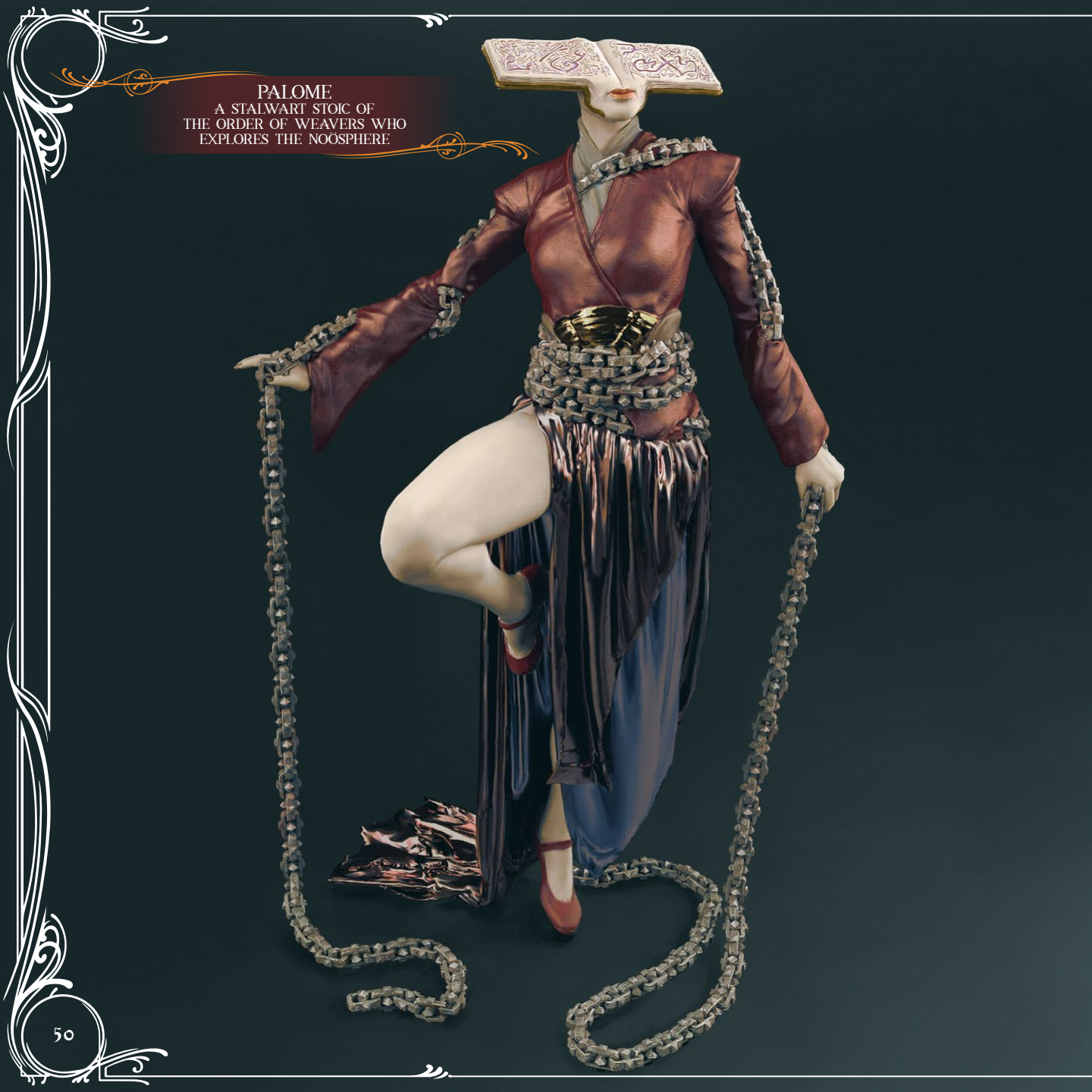
Weavers
Weavers are… well I’d say Ars Magica style magic? They’re the “Magic is an Art not a Science, go with Feeling weave the Threads of Magic!” types. THey aren’t even really an Order, being totally anarchic with no hierarchy or unifying organization. Except Really Bad Boardgames!
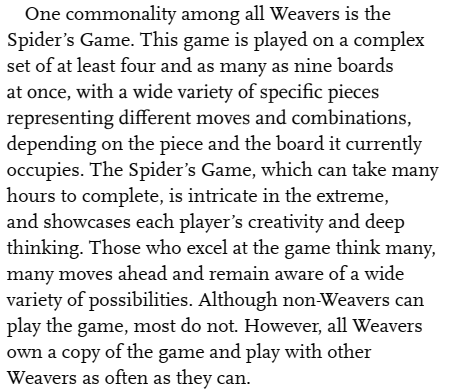
Anyway, Weaver Magic is… annoying. It’s not bad in concept, but bad in execution like everything else. As weavers go up in degrees they learn “aggregates”, starting at 2. These are magical concepts: Blood, Fire, The Sea, Wind, Diamond, Lust, etc.
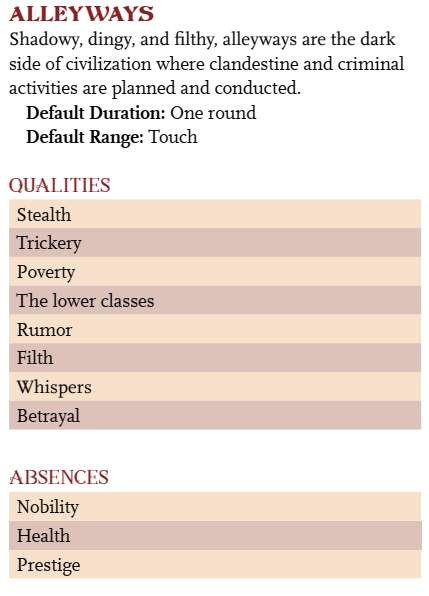
You basically look at your aggregates, come up with an improved effect you want to use, and ask “GM, May I Use Magic Please?” and they then decide to either deny you outright, just guesstimate and throw out a bene cost that sorta maybe sounds right to them they guess, then you cast the spell. As you go up in degrees you get more aggregates, and you can combine more of them together in a single use, you can “save” spells you made up to cast again at a lower cost than before, and so on. Like, this isn’t a bad concept for magic, and there are in fact some vague not super useful guidance for assigning level to spells, but it’s still mostly negotiation and GM May I? Ing and it just seems like a giant pain in the ass during play.
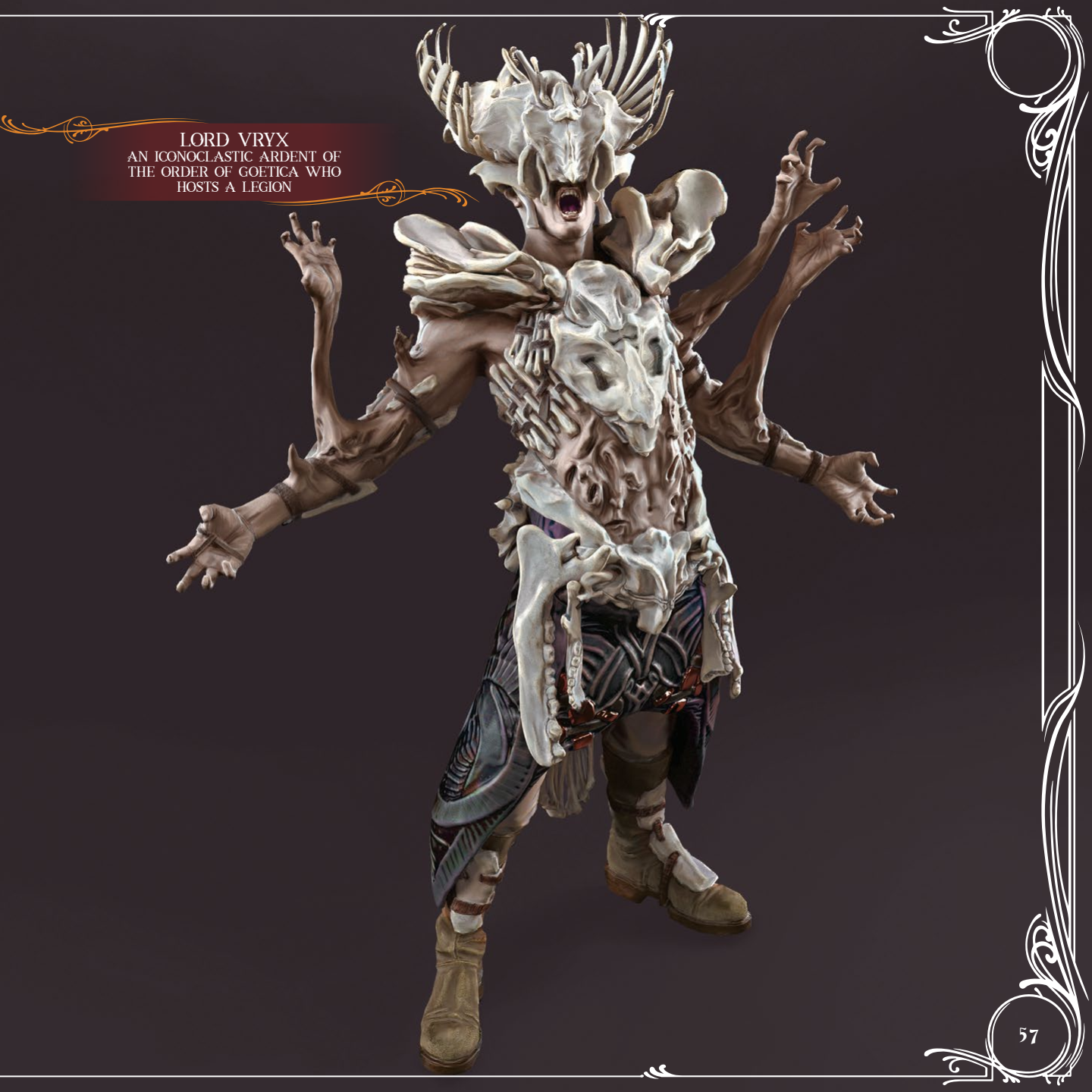
Goetic
They’re summoners. They summon demons, angels, elementals, spirits, etc. etc. The process of summoning and negotiating with an entity is called Colloquy. You basically pick an entity you wanna summon, spend Sorcery bene equal to the level of whatever you’re calling up, then you make a roll to try and convince it to work with you, and give it an order. As Goetics increase in Degrees they get better protection against summoned beings with like, circles and glyphs and such, can summon more powerful entities, give them more varied commands, and so on.
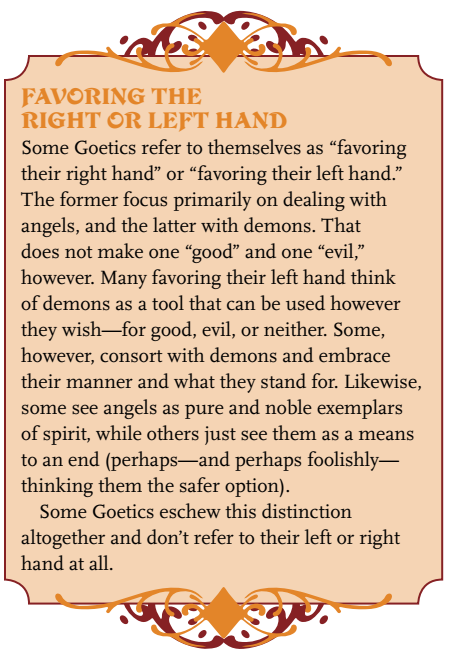
Culturally they love byzantine incomprehensible organization with lots of legalisms and complicated ritual and bureaucracy.
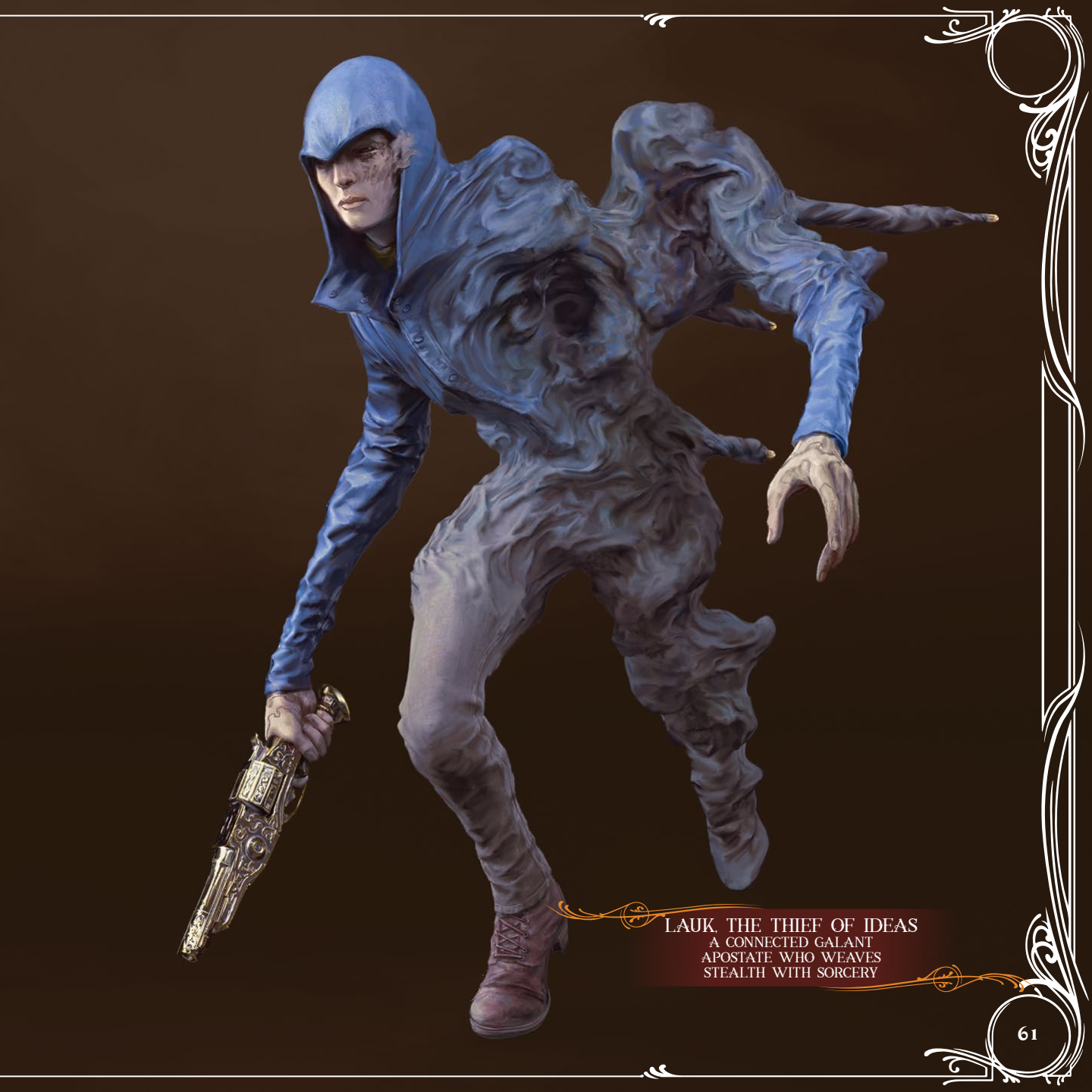
Apostate
These are the Vislae that don’t join the proper magical orders. You play an apostate if you wanna be a smug asshole.
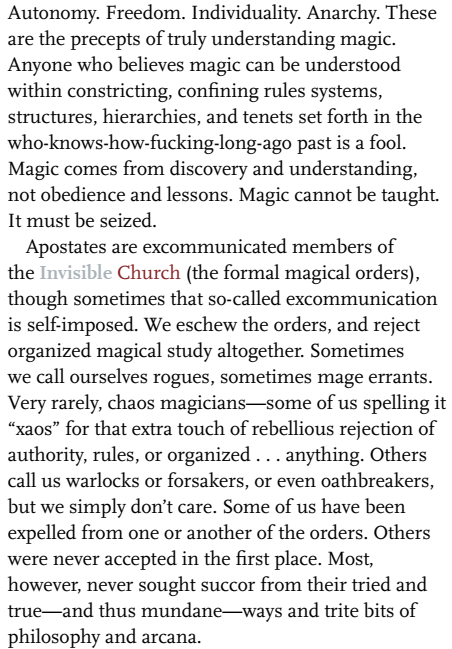
God what a bunch of tools.
Anyway, Apostate’s don’t get special magic or degrees. They get bonus general spells, the ability to counterspell, and can p8ick up Apostate Abilities, which are mostly magic-modifying stuff. Spells do more damage, you get bonus skills, you can drain magic from other Vislae, etc. Honestly it’s by far the best order because it doesn’t have additional poorly-thought out systems slapped on it. It’s mostly about giving you more die, better modifiers, higher skills, etc. and counter-magic and stuff.
Next Time: Heart, it’s really short.
Heart (Da)
Original SA post
Heart (Da)
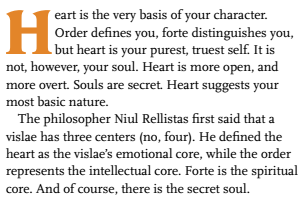
Ugh. This is a lot of nonsense to say that Heart is your starting statline. Literally, that’s it. Heart determines your starting stat pools for Certes and Qualia, and your starting skills. It does… some other stuff too. But we’ll get to that. All Heart works the same: You get a base stat value for Certes and Qualia that you then distribute among your Stat pools, you can then put 6 additional points to distribute as you want. Pick two skills from a list to start with a level.
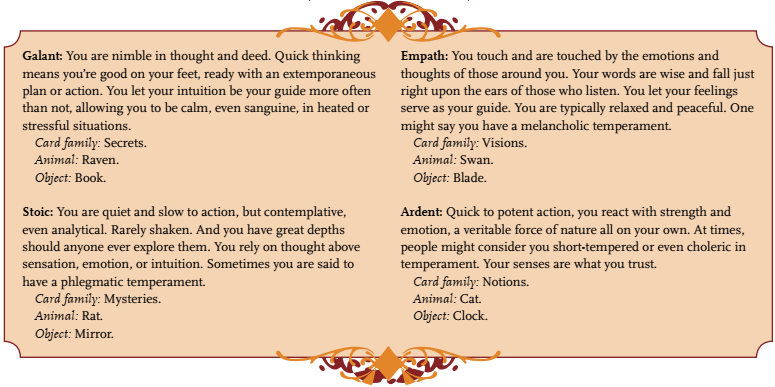
The issue is that there is only one choice that makes sense. Stoic has Certes 7 and Qualia 10, the highest Qualia of the four. Why does this matter? Remember the stats. Qualia includes Sorcery and Sortilege. That’s the stat that Controls All Your Magic and the stat that lets you add Bonus Die to anything you or other people do. They are literally the god stats. Bene are just a +1, while Sortilege is an extra die. There is no reason to use a bene when you could use Sortilege to enhance a roll. You pick Stoic, make your Qualia 16, then pump up Sorcery and Sortilege as much as you can, putting some in Intellect as well for Mental HP. All your Certes? That goes straight into Physicality so you have lots of Meat HP. Remember, you can only spend 1 bene at a time for a +1, why would you trade HP for a measly +1? You wouldn’t. Max out your HP pools and your Magic and Make Everything I Do Better pools and dump the shit out of Accuracy and movement and such. Because all points in those do is give you a +1. Only ever a +1, you just get more opportunities to add a +1 to your shit. There are 4 stats that matter out of the 8. Only 4. Goddamn how do you fuck up your game so bad that there is literally only one stat-array that ever will matter.
Oh, and that other stuff. As mentioned before, the Sooth Deck is basically a ripoff tarot deck that makes the entire game needlessly complicated and I fucking hate it so much. I’ll go into it way later, but a sooth deck card is normally always “in play” if it is, characters Hearts that match the suite get a +1 bonus to all actions, unless it’s an Apprentice card which is a -1. Once again, I’ll explain that later but just know it’s totally random and busywork so who cares.
Also in-setting Heart is basically your Meyers-Briggs Personality Index and people literally will talk about them like how people in real life talk about being INFJ or whatever. Also some magic bullshit is tied to it, like rituals and magic items. Not specifically what, just… sometimes magic bullshit gets affected by it.
Next Time: Forte, Holy Shit There’s more than 30 of these, oh god this chapter is 66 pages long help me
Right, Forte’s… god this is gonna blow
Original SA post
Right, Forte’s… god this is gonna blow. So, aFOrte are basically like weird subclasses, that’s the best way I can phrase it. Each one is like, an in-universe narrative thing, that gives you story arcs, Joy and Despair (remember, that’s XP requirements) actions, and a tree of abilities. Forte abilities use Sorcery, so More God Stat. Each Forte has an ability tree showing the order you have to buy abilities in, but you can move back in the tree so it’s really just a way to represent pre-reqs because they’re all Spend Crux to Get. Forte also increases your stats whenever you get a new ability in your Forte, which is the main way to get stat increases. Now, why did they make it so stat increases are tied to leveling up your Forte instead of something you can just spend XP on? Who knows. So, these are all.. Fucking… god. I’m going to condense a lot and this will still be huge because there are over 30 of these things. Let’s go.
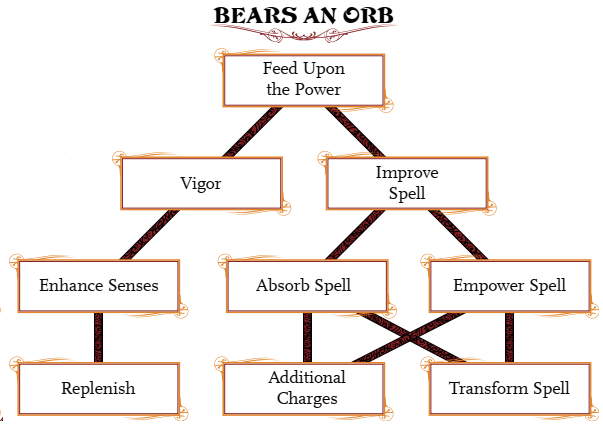
You have something called a Fanadon Orb. These are stone spheres about 4 inches in diameter, that enhance magic. Nobody knows where they come from, but they’re thought to be part of the Legacy. The orb has three charges, that you can refill instead of replenishing a stat pool. Most orb-bearers have it implanted into their body somewhere.
The abilities are mostly uninteresting. Feed Upon Power lets you use a charge instead of eating or drinking, Vigor enhances a physical ability for a roll, replenish restores your pools under one stat, the Spell things all basically act like metamagic. Modify a spells attributes, make it cheaper to cast, make it stronger, etc. Nothing noticeably stupid or interesting. I mean it’s cool, useful, but dull as could be.
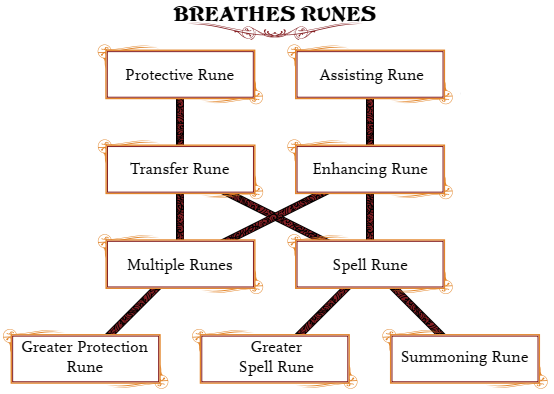
OK so you can make runes… by breathing them out. Like you can breathe magical misty letters and words and stuff that can store magic and trigger spells. They hover around and follow you. You only get one rune by default, but there are abilities to get more. Rune Breathers often smoke to enhance or hide the runes, depending on whether they want to flaunt or keep their abilities secret.
The abilities are split between “Use rune to give me a +whatever bonus to a roll/defense/stat/whatever” and “store a spell for later use.'' Summoning Rune is the coolest one and it just lets you turn the rune into a summoned being that does one predetermined task chosen when you make the rune. It’s more interesting than Orbs at least.
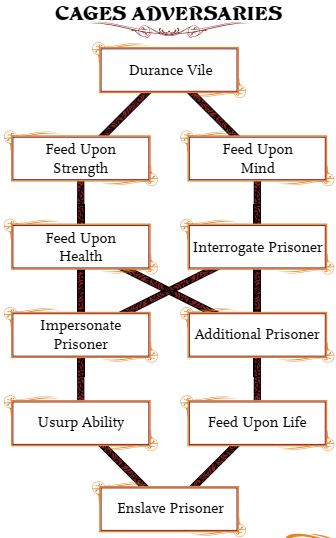
THis one is… interesting. You can magically imprison people and then… feed off them. They carry around a small magical cage that they can trap entities in. You can only have one cage at a time. You have to keep the cage on you, and people can see who you have imprisoned in the cage. Often Vislae get the cage implanted into their body. That’s actually kind of cool.
So, Durance Vile lets you cage things, the level is the difficulty of the roll to cage them. You can do stuff like refill pools by draining their life force, read their mind, transform into them, use their special abilities yourself… it’s pretty cool. The capstone ability enslaves the entity to your will, even out of the cage. So they can be out and you control them at any range with a thought. Prisoners do get a change every day to break out of the cage… which… isn’t given rules. Like it says they can attempt it, but I don’t know what that means mechanically. Whoopsy! So, this is conceptually kind of cool, but man how do you forget to put the rules for how things can escape your magic prison here.
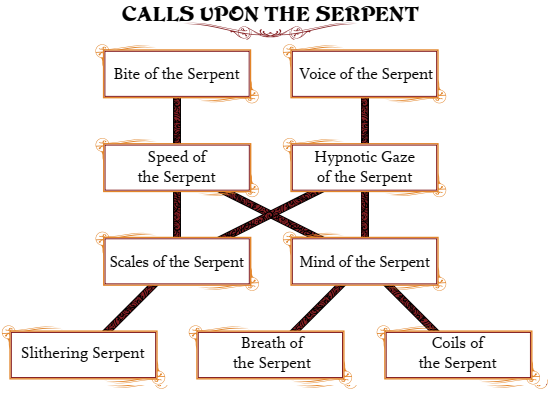
The Serpent is an incorporeal sort of Magical Snake-God that’s a cosmic being associated with the Suns. It’s snake magic. Like, when you cast things an illusory cobra hood appears around your head, you can do stuff like hypnotize people, breathe knockout gas, make a magical snake head bite and poison someone, etc. Slithering Serpent and Coils of the Serpent are the only interesting ones. Slithering is a long-distance teleportation ability, literally slithering through space-time, and Coils of the Serpent is a magic-buff that also grants prophetic visions.There has to be way more interesting ways to do cosmic space magic.
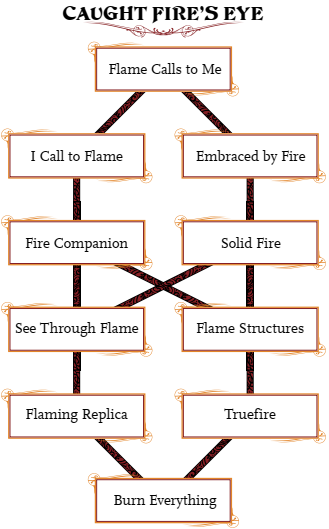
You're a member of a secret cult that literally loves fire. Like, not abstract, but thinks all fire is part of a singular entity that you literally marry and are now a couple with. You, explicitly romantically, love Fire.
The magic is fire magic. Like, do I have to explain it, it’s… it’s fire magic. Fireballs, fire-elementals, control and shape fire, make fire a solid object, be fireproof, yadda yadda you know how it goes. You are in romantic love with the concept and possible literal entity of Fire, how do you make it so boring as to be just regular ass fire-magic, goddamn what a waste.
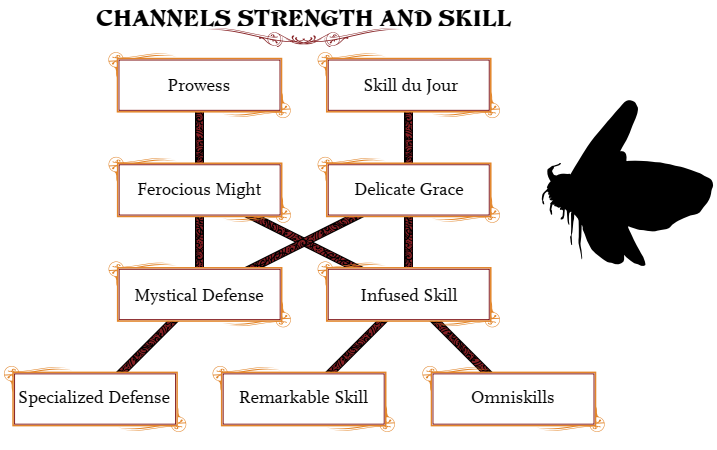
You can magically steal skills and physical ability from other beings. Not like, vampirically. You just can sort of borrow it from someone else in the multiverse, you probably never know who.
Fuck this is boring as hell. It’s literally nothing but bonuses to rolls. Get more bene, get more die, but literally NOTHING that isn’t just a bonus to a roll, no cool narrative tricks, no unique spell-like dealies. Just… Gooder Dice.
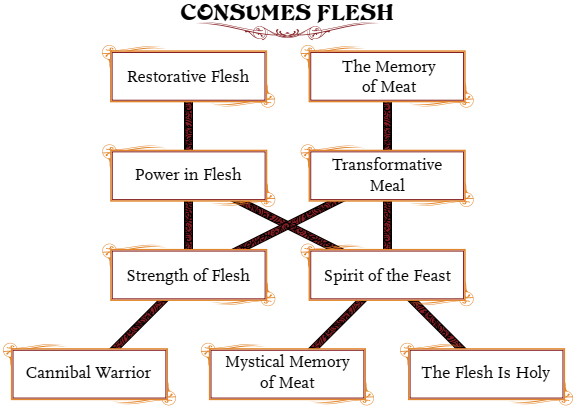
Magic Cannibals. You gotta eat the flesh of intelligent beings. Why this is a PC thing, I have no idea, I guess you’re supposed to be regularly murdering other sentient beings!
It’s… kinda cool stuff ability wise. Know something the dead person you ate knew, heal yourself from eating them, shapeshift into the dead person, summon and command their ghost, that sorta stuff. It’s flavorful, but I’d give any PC picking this a major side-eye.
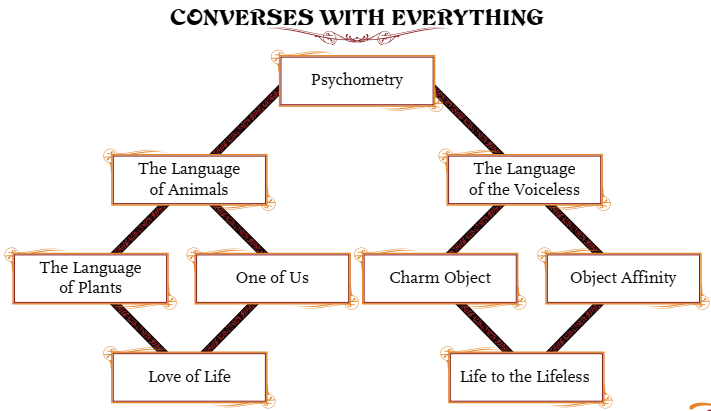
You can talk to anything, even the stuff that isn’t alive. Mostly it’s pretty explanatory just by the names of the abilities. Life to the Lifeless makes something ambulatory and living. It grows legs and arms and gets a face and basically turns into a Beauty and the Beast character. I don’t have an issue with this one. It does what it says on the cover, but what it says is pretty cool. It gives you a novel neat special power and lets you use it in the ways you’d expect and a few creative neat ones, would like if it was in a better game.
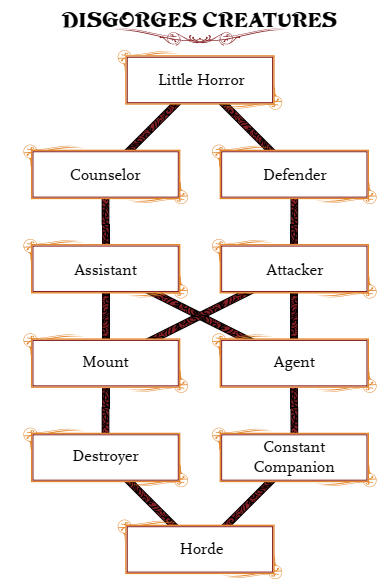
You can birth creatures from your gullet. It’s… gross. They’re weird mutant flesh things. Horking up a baby abomination costs Physicality as well as Sorcery, and only last a day by default. You got these by being infected with the T-Virus. Abilities are just higher levels of creatures specialized to do different things. You can infer how it works. Defender boost your Dodge, Attacker can attack stuff, Mount you can ride on and it moves fast, etc. Conceptually it’s cool in a grody body-horror way, but mechanically it’s just making generic weak NPCs to do stuff for you. If there was more customization or flavor I’d like it more, but this is just… the dullest way to implement “Vomits homunculi servants”.
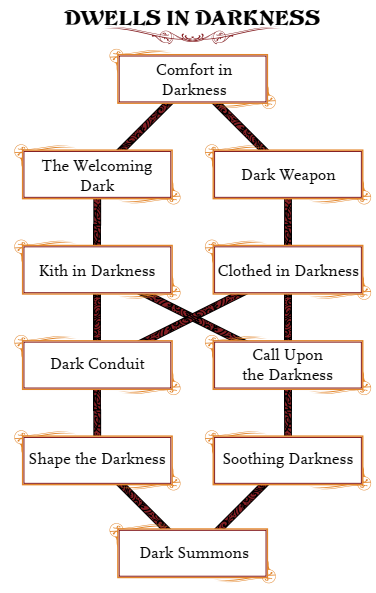
Goth Darkness Wizards. Like you just got Darkness Magic and are a sneaky gothy person who loves the night and consorts with demons and shit. Stealth buffs, see in the dark, shoot Dark Lasers, teleport through shadows, make illusions in the shadows, and summon demons. Nothing bad, nothing interesting, just… exactly what you think about when you hear “Darkness Wizard”.
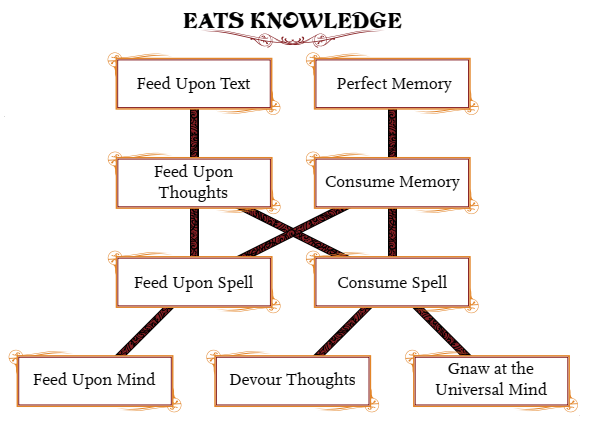
Right so, Logovores are people who can survive by eating knowledge, no other food needed. The problem is that when they eat it it’s… gone. Like, they can “eat” a book and it’s blank now, they can eat your thoughts and you literally have a brain-blank and stop thinking while they’re doing it. They can eat memories and you forget them. IT explicitly states that they’re discriminated against and generally try and hide what they are, because… well duh. Nothing about this seems redeemable. Not blatantly evil, but just, unbeneficial to others in every way. So yeah they can have perfect memories, eat memories and thoughts and books to learn them instantly, etc. Feed Upon Mind lets you straight eat someone’s entire mind and leave them a zombie in exchange for… know ing three things they know. What an asshole move.
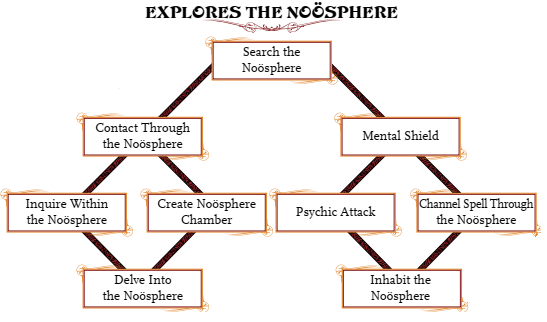
So, the Noosphere is… I don’t know if it’s a literal physical place but it’s just a fancy term for the universal unconscious. It’s like the psychic network of all minds. Oh, wait, it’s the Astral Plane. People with this forte can astral project into the mind-zone.
This lets you find people through it, use telepathy and other psychic type abilities, mess with people's minds through the noosphere, remove view through them, and at the highest tier you can become a permanent mind-ghost that only exists there but can temporarily manifest a physical body. So… I actually like this one. It’s flavorful, useful, gives you more than just “psychic powers”, and I actually like the becoming a thoughtform stuff.
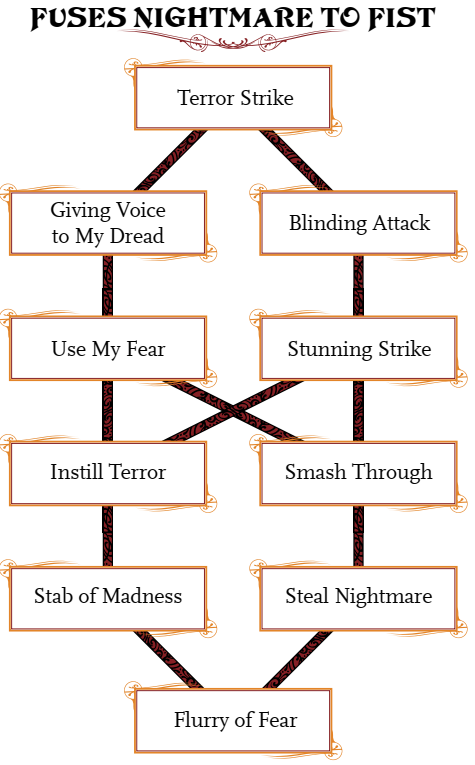
This one is just stupid. Conceptually and mechanically. You punch people with nightmares. Like, you punch them, and you shoot Spoops into their brains. You have horrible nightmares all the time, and channel them into magicak fistfighting that traumatized people’s minds. Mostly this is just… you can punch gooder. More damage, more accurate attacks, better defense, some combat debuffs like stuns and blinds, there’s even a “You can smash stuff gooder” ability. This entire Forte can just be reflavored to totally mundane martial arts with no issues at all, the “fear” effects are completely tertiary.
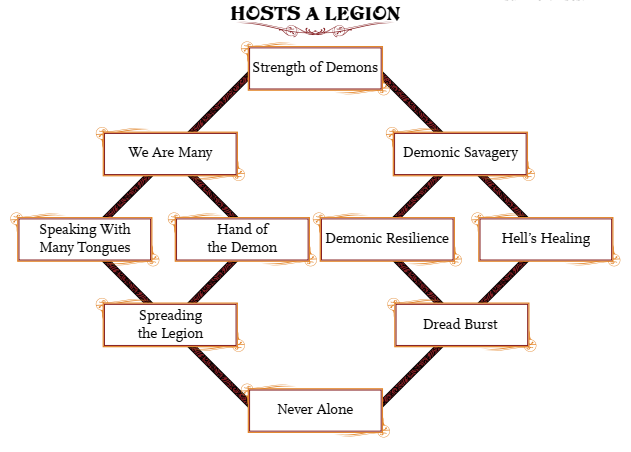
You’re possessed by a bunch of demons. They talk to you, but don’t control you. So Invisible Voices in your Head that also give you some superpowers. So many of these are just stat bonuses, like all fortes so far are mostly pissy stat bonuses. 3 Bene to Perception, +4 to Certes, they might be good but they’re so fucking BORING. It’s just numbers going up. You get minor telepathy, can mind control something by sending a demon to possess them, and can manifest the demons outside of you as allies in a fight as the capstone. Everything else is just Numbers Go Up. I’m so sick of Numbers Go Up.
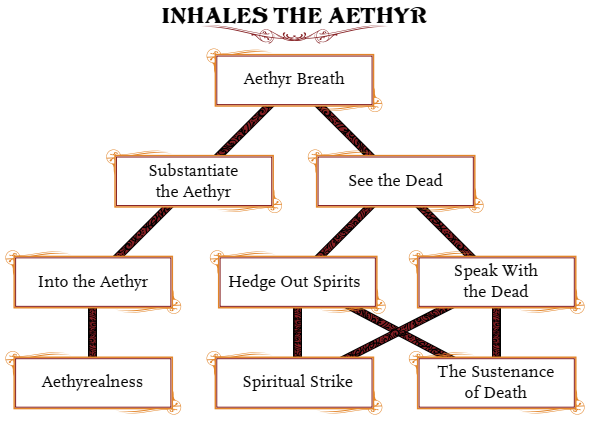
You’re a Ghost Wizard. Basically you’ve become like a pseudo-dead and can do some weird Ghost Stuff. Aethyr is like… Ghost Air, the Ghost Field, that sorta thing. Anyway, This one is actually cool. You don’t have to breathe anymore, can see, talk to, and manifest ghosts, fly through the air, turn intangible, punch ghosts, and the capstone is you straight turn into a ghost. Like, your spirit leaves your body, but you can manifest physically at will via ectoplasm and get a +1 to all actions while ghosty. I legit dig this one, good job, neat mechanics and systems and nothing that’s just a boring bonus to numbers. This is what I’d want to have if I was a Ghost Wizard.
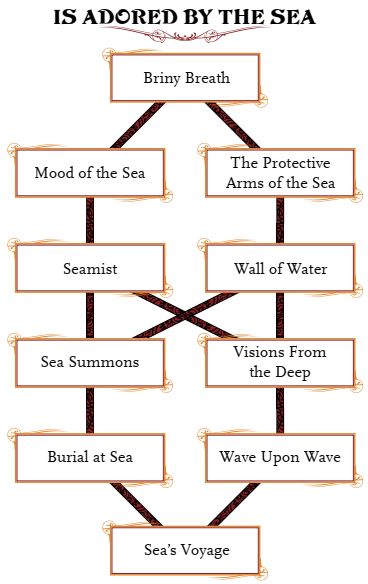
So, this is like the Fire-one but instead of wanting to fuck an element, the element is your Daddy. You’re like the “children” of the sea and it loves you familial style. It’s… water magic. Breathe in water, control water, create fog, water blasts, the capstone is to summon a magical ghost ship that lets you sail between dimensions. It’s actually kind of cool? Feels a bit unfocused though. The magic ship thing is cool, but most of the abilities are dull water-magic stuff. Oh well.
Next Time: The rest of the Fortes. This is the halfway mark, do you blame me for going slow?
no pics, just shits.
Original SA post
You guys know how Forte’s work now, so we’re whipping through the 2nd half faster, no pics, just shits.
Listens to the Whispers
You can see and talk to ghosts and spirits. Wait, doesn’t the Aether one let you do this too? No wait this is… ok. This is not ghost stuff this is more like… you have voices in your head that tell you things? All the abilities are mostly around information. Whispers tell you stuff for X bonus. So it’s stuff like just knowing what’s behind a wall, what someone is thinking, information about a creature or object, etc. Mostly though it’s, as always, numbers go up. 6/10 are Numbers Going Up.
Provides a Vessel for Spirits
You’re possessed by incorporeal beings that you let live in your meat-form. You’re a member of the Cathedral of Illuminism, which teaches you how to be a spirit-vessel. No idea why, yet because that’s in another book. Baseline ability is to let a spirit control you however it wants for a minute, but you get healing in exchange. Flavorful but it’s either no problem or a fuck you, this game loves giving agency totally over to the GM I notice. You also become auto-friendly to Spirits you meet, and that’s it for interesting stuff. 8/10 abilities? Numbers going up. Just more benes or +1’s or enhancements to abilities.
Revels in Beauty
quote:
As one who revels in beauty, I see beauty in
(nearly) everything. I find the good in a cast-off
chunk of stone and the grace in a worm crawling
in the muck. As I learn to become even more in
tune with such things, my perceptions become even
stronger. It may seem a modest pursuit at first, but
eventually I will transcend to a higher mental plane
of true beauty.
People can more clearly see the beauty in one
who revels in it. They find me likable, compelling,
and pleasant to be around.
Shepherds Minds
Ugh, OK so it’s really obvious Cook was running out of ideas consistently. This is Telepathy. Like it’s just… you have telepathy. Noosphere also had telepathy, but this is more better telepathy. Read minds, talk to people in their heads, shoot mind bullets, mind control, memory edit, yadda yadda. It does what you want for Telepathy Powers, no Numbers Go Up, so that’s nice.
Sings the Earthsong
You sing to dirt to do dirt-magic. This says there’s something called the Primal Earth Singers, but gives no detail about what they are, so. It’s your Earth Magic stuf. Control stone, get natural armor, walk through stone walls, cause earthquakes. Of note is the capstone ability, Drinking the Earth’s Blood, which is straight up from the Thomas Covenant novels but worse. Instead of giving you essentially a once-in-a-lifetime Wish it just… gives you a vision pertaining to any topic you chose and a +1 enhancement to act on that information.
Speaks with the Moon
quote:
Moon is mother. Mistress. Lover. Friend. She is
always worthy of respect and admiration. Is she not
beautiful? Is she not steadfast?
The moon is subtle, a whisper to the sun’s
shout. She is a delicate but complex piano piece
to the sun’s orchestral grandiosity. This is not to
cast aspersions upon the sun, or suns—because
who would do such a thing? The moon does not
compete with the sun. She is not the sun’s rival.
But it falls upon me, as one who speaks with the
moon, to point out that she is a quite different thing
altogether.
What is with this sexual tone of conversation about natural forces all throughout this book? Anyway, it’s Moon Magic, you’re called a Moonchild and were made when someone did a magic ritual over you as a newborn. This Forte is poorly thought out, because… well they assume that Being Night and Being an Action are equivalent trade-offs. Most of the abilities just work when it’s night, you don’t have to spend an action activating them and they cost no Sorcery bene to use. Just because the sun is down you can get: +1 to ANY action, +2 Perception Bene, +3 Movement Bene, +2 Armor, and +1die to all defensive rolls for free. THis is both broken and garbage, because piddling bonuses that are too easy to get and so players are just going to be pointless pains in the ass about what time of day it is. Other abilities are OK. You can fly in moonlight, Locate people or objects that are touched by moonlight, teleport to anywhere touched by moonlight, and summon a moon-spirit.
Splinters Into Fragments
Ok this one is fucking weird as hell. You can shatter into… glass like shards, and then reassemble. In weird ways. It’s a bloodline thing. It’s fucking weird. OK so some of the abilities are… reasonable. Shatter when attacked to get a bonus to Dodge, explode into fragments that cut and hurt people, splinter and reform to heal wounds, weird but makes sense. The rest are… I really need to go over all of these. I have to assume Monte Cook stole this from somewhere else because it’s too weird and creative for him. There is no way he thought this up himself.
Two lets you clone yourself into two people. Both of you get your own turns and actions, but are at -3 to everything as long as you’re doubled, and you can’t do any magic. Reduction… shrinks you down to 4 inches tall? You’re just tiny now, and have less health and move really slow. But you’re tiny. Many clones you into multiple forms, exactly like Two, but you can make a lot of you. It costs more mana, but is strictly better. Growth is the opposite of reduction, where you become 12 foot tall, and get more HP. Reassemble Elsewhere is straight up perfect teleportation: You don’t need to know where you’re going, it has a 10 mile range, and passes through solid objects perfectly. You can’t even fuck up and teleport into a solid object, it just doesn’t work if that happens. Shattered Mind lets you, for one round, possess another entity somewhere in the multiverse and hear and see everything they can for a few seconds, and say up to 6 words. You can do this to multiple beings at once. The last one Shattered Soul is straight up just Horcruxes. Split your soul into nine fragments, hide them around the Actuality. When you die you reincarnate from one of those fragments. If you use it, you can’t do anything with your Secret Soul (Wizard Zodiac).
Fucking bizarre.
Travels as a Spirit
Astral Projection, NEXT.
Turns Tales Into Reality
Called Talespinners, twee annoying assholes, you’re a fucking bard, with weird narrative magic. It isn’t cool. Call Object From Metaphor means you say a metaphor and the metaphor literally becomes real. “Slow as molasses” and you get a pool of molasses on the floor. Summon an inanimate object from a story you know, teleport yourself and others around as “scene changes”, summon creatures from stories you know, create illusions, call weather from a story, bring some fictional location, object, or creature into reality somewhere but you don’t know where it is.
Understands the Words
Word magic. I actually kinda like this one, it’s thematically strong and useful. There’s a few Numbers Go Up, but mostly the abilities are pretty cool. Words Become Truth lets you cast illusions by writing a description onto an object, and it now is that thing to anyone perceiving it. Change the Name lets you transform an object by changing, adding, or removing one letter from its name, Transform From Words lets you summon a generic version of something by describing it in detail, Transform Into Words lets you basically destroy or kill anything by converting it into the description of itself. Use the Name lets you basically get total reality-warping control over any being who’s Secret Name you know.
Walks the Path of Suns
Woof. OK so the Path of Suns is basically the structure of the Actuality/Multiverse/Planes in Invisible Sun. This is a fancy way of saying, you’re someone who really digs going around dimension hopping. You get abilities based on each of the Suns/Planes. The abilities have no coherence within the Forte because they’re based on the Suns gimmicks. So it’s sort of a mishmash of stuff, mostly lame. Travel the Path is the only cool one, the capstone ability that lets you jump between Suns at will and arrive anywhere you have been before when you arrive. That’s neat.
Wanders In Delirium
Malkavians. They’re Malks.
quote:
Life is nothing but a dream. Cause and effect are
illusions. Nothing really matters.
I wander about the world, but I am not a part of
the world. It is too strange and too distant and too
other. I have long since stopped trying to assign
meaning or make sense of anything.
But still I can enjoy existence, even if it is a farce.
I can love. I can laugh. I can experience the wonder
of the dream that I walk through. It doesn’t need
meaning to be entertaining or pleasant. I like it this
way.
My delirium protects me. My madness shelters
me from those who might do me harm. Other
people of the world cannot deal with direct contact
with my mind or even my presence, but that’s fine.
What does it really matter, anyway?

This is the single worst magical ability I’ve ever seen. How does this work? I have no idea. I guess that this lets you… rewrite reality at a whim? Like, if anyone poses a question you can just… use this and make the answer whatever you want. This seems custom tooled to start fights with your GM, because it’s the only ability like this in the entire game, nothing else gives you narrative control like this.
Warps Time and Space
This one breaks the game. Both in the Overpowered way, and in the “Oh god, why would you do that” way. The inoffensive abilities are: No Space, which lets you treat any container as if it was a 5 foot cube inside, Long Step which is just a really fast move, Frozen in Time which just makes something both unable to act but also unable to be acted on, Diverted Angle which can change the path of a moving object, Dismissal which is just a targeted Teleport to somewhere you’ve been before, and Spatial Warp which lets you make a portal to anywhere in the Actuality you want (It’s a level 10 spell, so that’s fair for that late in the campaign and that high a power-level). The rest are complete bullshit of various flavors. I’m going to include the full text so you can follow along.
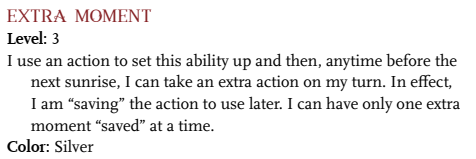
So, as anybody knows: More actions are better. Even this limited, you still have to deal with the fact that this Forte gets to have more actions which is insane. If this was all they had, it would be understandable, but this is just the start.
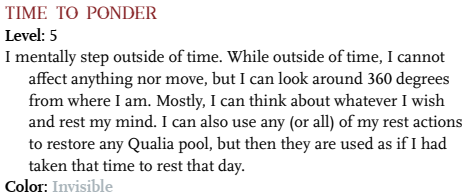
Qualia is, remember, the stats of Sorcery and Sortilege. Sorcery controls all magic, including Fortes and such, while Sortilege can add dice to any action. They are the God Stats and you will make them as high as you can if you have a functioning brain. You get four rests a day, then you need to take a Long Rest. What this does is let you just recover your most important stat pools whenever you want. Just stop an action scene and refill all your magic, just say Hold On A Moment and get back all your Bonus Dice. Whenever you want. This means that the GM cannot pace you out of having a rest, you can have one whenever. Like if a Wizard in D&D could just re-memorize their spells whenever they wanted.
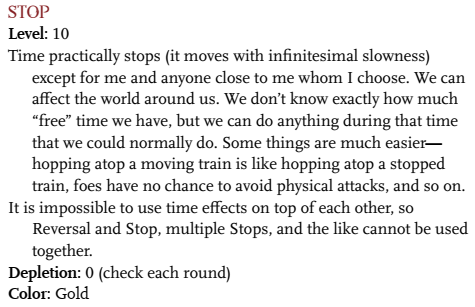
Level 10, so somewhat forgivable but that “We don’t know how much time we have” thing is just… awful. It turns it into a GM Decision how useful you get to be when you cast this. It’s hilariously broken, but only if the GM lets it be: They could give you one free action or a hundred. Ask Your GM!
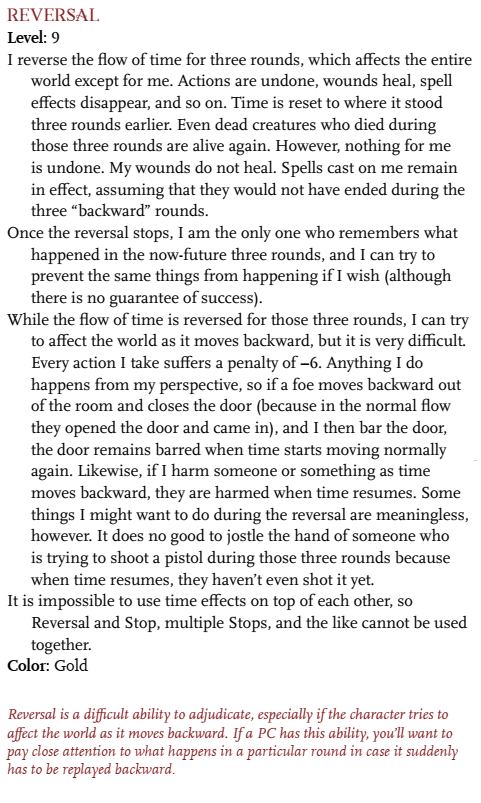
Do I have to explain this one? Just read it and start screaming at how terrible an idea it is to have this as an option in any RPG.
Weaves Stealth and Sorcery
OK so back on basics. Mostly you get Numbers Go Up When Doing A Sneak. You can see through walls, erase 5 minutes of someones memories, WALK through walls, turn invisible, teleport to your house in a puff of smoke, create mass perfect illusions in an entire area. Honestly I’m fine with this. It gives you some pretty cool stealth tools, some fun gimmicks, it’s Be Great At Sneak the Forte, does what it says, good job.
Writhes and Squirms
You make a pact with the “Forgotten Mother” and become an Eldritch Abomination. You get tentacle limbs, to grab, crush, throw shit, you can squeeze through tiny spaces, read minds by touching people with your tentacles, turn into a giant tentacle monster, spawn tentacle baby monster servants, and so on.
Next Time: We’re Finally Free of Fortes! It’s time for Wizard Horoscopes!
Soul (Ka)
Original SA post
Soul (Ka)
I'm going to whip this out real quick because this is a short chapter, but it is also packed full of stupid. So, this step is where you pick a Secret Soul. So, this entire concept is... vague and difficult to understand. Not in a neat "oh that's so wild" way, in an infuriating "Shut the fuck up and speak plain English" way.
So I can't tell if you... like just have one as part of being alive? Or if it's something you choose? Like in-setting. I think that you're born with it? Maybe only if you're a Vislae? Becoming a Vislae gets you a Secret Soul?
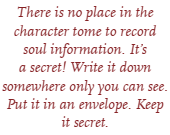
Anyway, there's 13 of them. The Souls, which are sort of cosmic constants and Godlike entities because each has a "Guardian" which is basically a god, and everyone who shares the same souls are all technically part of an organization called the Magisterium. The Magisterium isn't actually a thing. Maybe? Each Soul, which is basically a god you pledge allegiance to, has a secret society. To be part of the society you have to make your Soul Allegiance public, which is bad for reasons. These organizations are collectively called the Magisterium.
If this is all annoyingly vague, that's exactly how it reads.
So what does the whole Secret Soul thing do?
- You can spend 1 Crux (XP) to invoke your Soul Guardian (god) to get a Gift. Which is basically some special ability or bonus depending on the Soul in question.
- You can speak a Death Curse. This is literally Death Curses from Jim Butcher's Dresden Files series, which I expect to show up in the Inspirations section that will be somewhere in the CUBE. You basically cast an improvised spell equal in level to the highest spell or effect you know when you die.
- SECRET NAME, which is in so much magic shit I can't even be mad. Anyway, appearently if you know someone's Secret Soul Allegiance it's like having their Truename. You get a +1 to any magic effects targeting someone who's true-name you know, or who knows YOUR name. If you revealed it to them. So you can tell someone your true name and then... you both get +1's against each other?
quote:
You always gain a +1 bonus to
any magical action (forte ability, spell, ritual, and so
on) made against someone who you have revealed
your name to, or who has discovered it on their
own. There is, then, a delicate and dangerous aspect
to revealing your secret soul name as well as to
discovering those of your enemies.
Anyway, this is all a bunch of bullshit. You know what Secret Souls actually are? Fucking Wizard Zodiac. It's your goddamn astrological sign. Ever play any of the Elder Scrolls games? You know how the birth-signs work? That's exactly what this is.
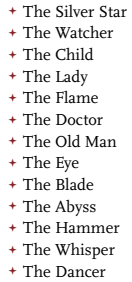
This is a list of all of them. Now, I would go over them, but they're all so very minimalist that I'd literally be copying the book out. I can't really even give opinions on them, because they're shit. The Gifts are all piddly minor bullshit, the descriptions read like lame horoscope descriptions, I'm just going to paste some of the highlights and let you laugh away.
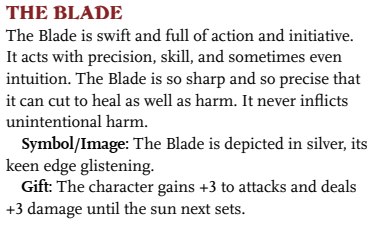
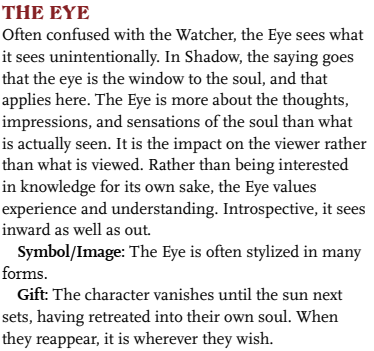
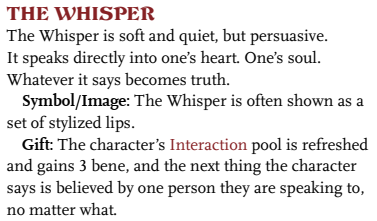
FOUNDATION (LA)
Original SA post
FOUNDATION (LA)
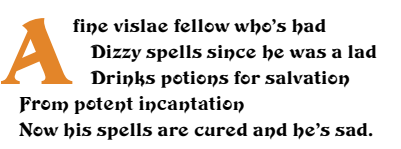
So Foundation! What is it? Confusing! See they SAY Foundations are your personality, current social standing, etc. But they aren’t. Remember how previously I mentioned, over and over, Wizard Interior Decorating? How Wizard Interior Decorating is A Big Deal? Yeah this is the Wizard Interior Decorating chapter. Foundation is a pun, because foundation of your house.
Anyway, there’s 8 foundation’s and they’re all boring as hell. In basic terms it’s your starting money, Hidden Knowledge, what kind of House you have, connections, and so on. Yes, it is incredibly boring.
As a side-note as I go over these: Money is in Crystal Orbs. The currency system is fucking insane and awful, but that’s a while to go. Just understand that Orbs=Cash.
- Established Normal! You have 100 Orbs, 50 Orb income, 10 Hidden Knowledge, a Level 3 House, 2 Levels of Connections, and One free Level 3 or Lower House Augment. All that clear as mud? Good because it explains all this later in the chapter so suck it up.
- Itinerant: You get a bit more starting cash, lower income, 5 more hidden knowledge… but have no house. You do get 1 level in… disguise, survive, or sneak skill and a free secret or spell of level 2 or lower. So you’re trading a house in exchange for a bit of extra Min-Maxing Power. The choice of system mastery types I’m sure.
- Connected Way less money than Established but more Connections.
- Eremetic Hermit, but Pretentious. You get more money, really nice house, no Connections.
- Mendicant It’s like Itinerant but More So. You are broke ass homeless but get a free secret or spell of level 3 or lower. So just worse than Itinerant unless you have some bullshit system wonk strategy that a level 3 secret or spell lets you kick off and break the game in half.
- Iconoclastic Identical to Established. Like the differences are so minor they really have no reason to exist as separate things. You don’t get the free house augment, so it’s just… it’s worse for no reason. The flavor text for this states that this represents “your main drive is destroying or overthrowing a major group, organization, or class” which is not in any way represented in the mechanics.
- Stalwart Opposite of Iconoclastic in that you support an organization. It’s basically the same as Iconoclastic, but you get 3 Levels of Connection in one specific group instead of basically none for Iconoclastic. It’s just better than Iconoclastic is what I’m saying, the numbers are better.
- Bizarre You’re just A FREAK. Once again, less money than established, but you get a better house. Like, house is higher level, get a free level 4 augment.
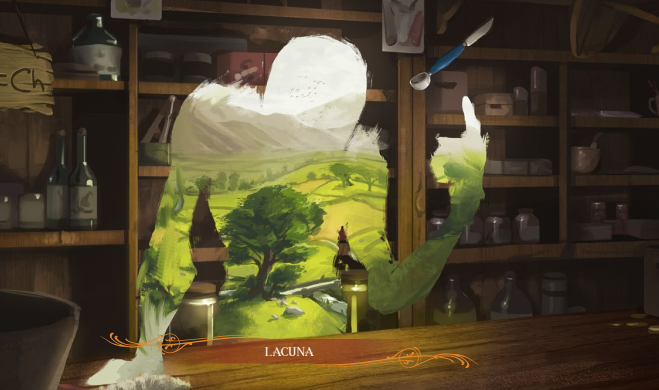
VISLAE HOUSES
Yep, HOUSES. Told you Wizard Interior Decorating is important.
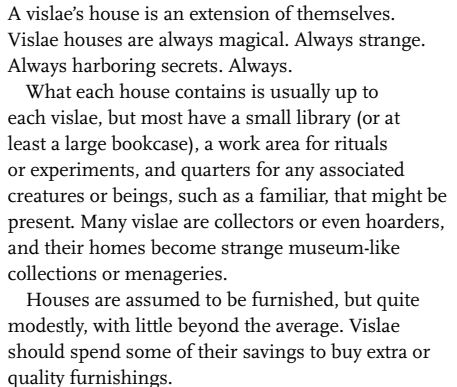
So houses are made up of three things: Type of House, Level of House, and Augments.
Augments are special features and abilities tied to your house. You can buy them with Acumen (XP). What type of house determines how many augments you can have. House level is increased with Crux (The other XP) and determines the level of the augments you can have.
House augments are, by the by, In Another Book. So you don’t get to know those yet.
So house types! You have Small, Average and Large which just refer to size. Small is an apartment, Average is a standard house, Large is a big ass mansion. They give you 5, 7, and 8 Augment caps respectively.
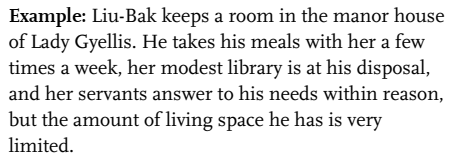


Prominent means your house is famous or well known in some way. It might be a landmark, or historical significance, or just very recognizable. Seven augments.

Unique are like… well. Houses that aren’t normal buildings. Made out of whimsical stuff. 6 Augments.

Hidden are.. Hidden. Not in public, you can’t easily find it. Secret hideout stuff. Five augments.

You also have to choose a peculiarity for your house. Which is… just Random Bullshit. Maybe your house moves! Has a ghost infestation! Doors lead to the wrong rooms! Squatters! Drafty! It’s all stuff that’s actively annoying to players and nothing that seems cool or fun.
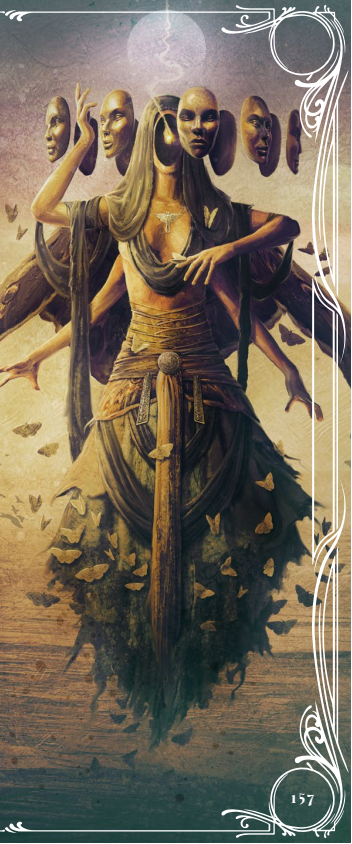
SHADOW SKILLS AND MEMENTOS
Right, so while you were trapped in Shadow IE The Real World and not Cool Wizard World you learned things and got stuff. When you came back to Cool Wizard World you kept one skill and one possession from Shadow. Skill is just… you get a level 2 skill relating to whatever you did while in Shadow. Bleh.
The shadow possession is also shit. You basically get to pick one thing from your Shadow Life that you bring back to Actuality with you. The thing you bring back works even if it makes no sense, like smartphones still having internet connections and cars running without gas. These are explicitly useless.
quote:
However—and this is a big however—in the
Actuality, things that would have meaning only
in Shadow are seen as the obvious and downright
absurd deceptions that they truly are. A television
show, even a news program or a documentary,
appears fake, silly, and vapid. Information gained
on a smartphone is meaningless. Texts and phone
calls are mostly nonsense.
QUIRKS
Fuck me I hate these. OK so you get a Quirk. It’s just… random bullshit. You make one up or pick one from the list. The suggested ones are awful and well…
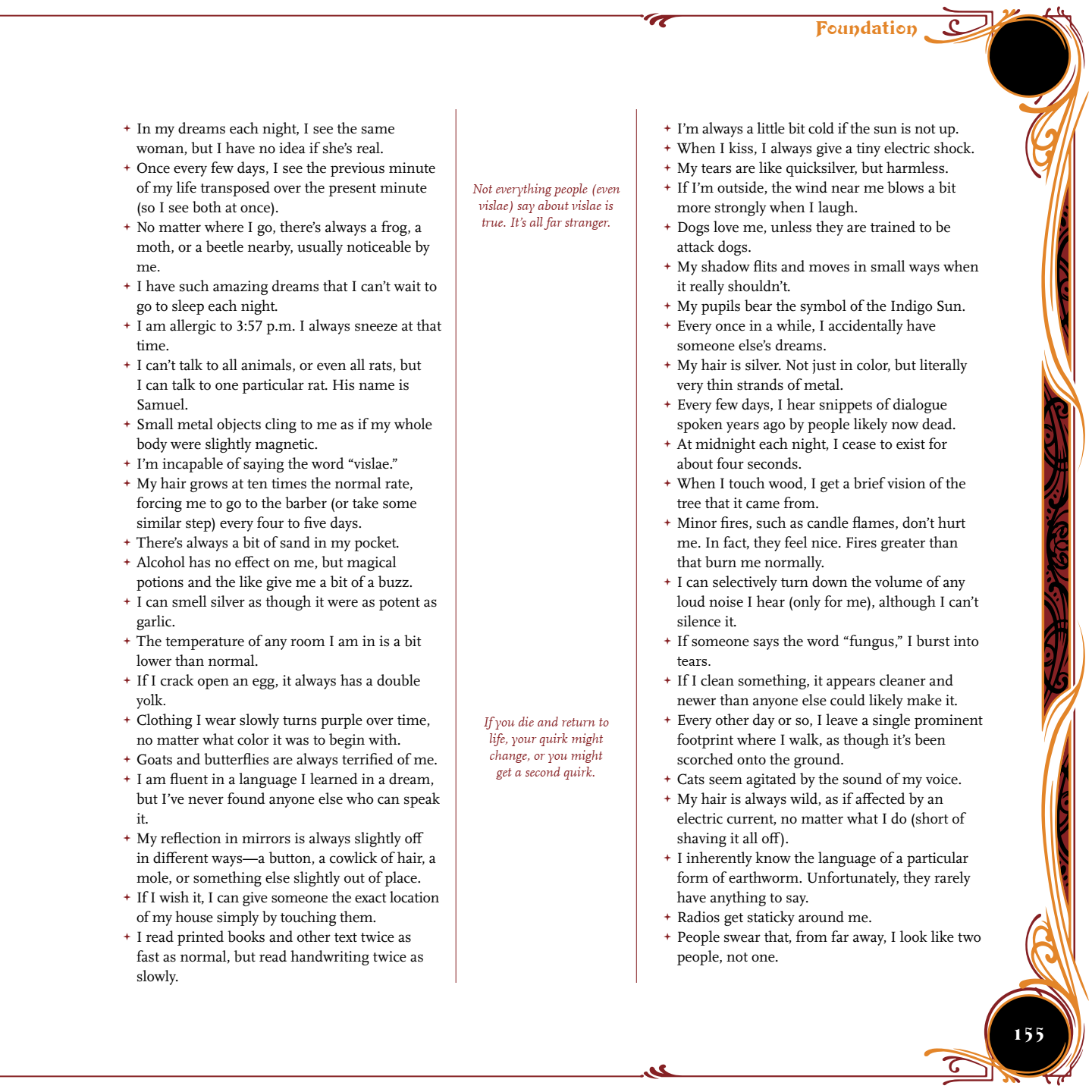
You can feel Cook trying to be original or interesting or fun or just… clever and it just never ever works. Not a single one of these feels properly strange or magical, just like weird random bullshit you put in your Livejournal RP Description of your Harry Potter OC.
CONNECTIONS
Connections work just like skills, but they apply to organizations, groups, and social class. Whenever you’re interacting with that group, or making any roll connected with them, you can use that connection as a skill. I’d list some of them, but pretty much all of them are just names of setting stuff with no context.
NPC BONDS
THese are not in any way connections. These are stupid as shit though. So, Bonds are with specific NPCs. To get them they cost Acumen. Each bond represents a type of relationship with an NPC, for example:
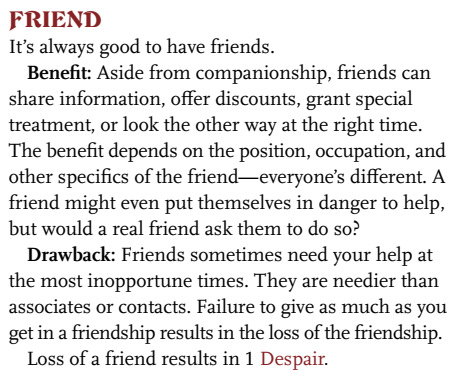
The bonds are Associate, Contact, Friend, Old Friend, Lover, and Relative. Can you see the issue?
These have no mechanics. Like, they may earn you Joy or Despair, but they have NO MECHANICS. These are purely narrative descriptions, but you still need to spend XP for them.
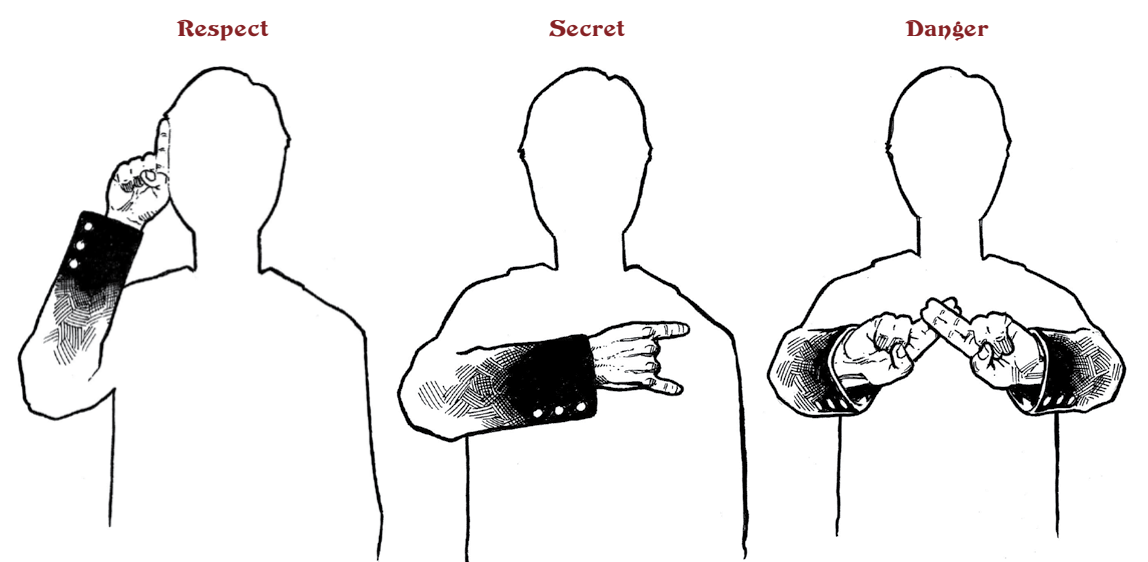
Next Time: Sick of Character Creation Yet? The Final Step: NARRATIVE MECHANICS
Character Arcs (Ver)
Original SA post
I’m back babies! Now I took a hiatus because everyone was all a tizzy about other projects, and I don’t like sharing that limelight y’know? But I’m here still because we got so much bad to get through. Namely, this time it’s something truly awful:
Character Arcs (Ver)
Yes. See Monte Cook apparently saw another game for 5 seconds out of the corner of his eye one day and decided to copy it without understanding a damn thing about how it works.
That game was Jenna Moran’s Chuubo’s Marvelous Wish-Granting Engine.
Yes, that very difficult to understand super narrative revolutionary weird nontraditional RPG was ripped off by Monte “3rd Edition is Best Edition” Cook. It is bad. See Cook… never really figured out what a “narrative” RPG is. Like, I don’t think he’s ever read one, just… heard about them vaguely through hearsay. He doesn’t seem to comprehend the point of narrative mechanics.
Narrative Mechanics are big though. They’re The Thing, so Monte wants them in his game, so he works out his big massive brain and figures out exactly how to do it, and it’s the stupidest way possible.
I’m going to show you one, and break down just why this is fucking stupid. You start with one Character Arc. Like, you start the game having one started and on your sheet.
“Wait, how do you write down a character arc? Is this like… a character goal? Planned arc for your character worked out with your GM?”
Nope, that’s sane and reasonable. This is a character arc:
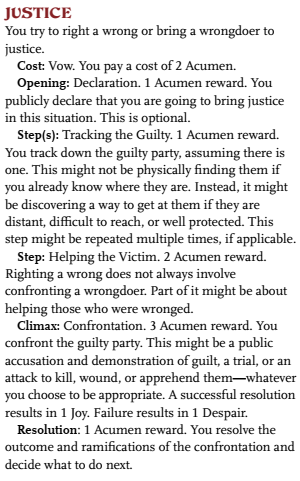
I’ll let you take that in before we start the breakdown. Really read over that and internalize how fucking bad an idea this is.
So, character arcs are the main way to earn Acumen, one of the types of XP in this needlessly complicated game. The first character arc you get is free. Every arc after that? You must pay Acumen to start.
What this means is that there is an XP tax for Swearing to bring the Villain to Justice. Sorry Mezzamalch the Crimson Swervish you can’t try to catch the Shropshire Slasher, you don’t have enough Acumen to afford starting a new Character Arc.
You see how each step is… very specific, but also unhelpfully vague. Also some are optional. First off, no they aren’t optional, they’re goddamn XP rewards. You will always do the Optional steps because XP.
So the steps. They’re… specific. Really specific about what happens, but super vague about details, both are unhelpful. They’re too vague to give a GM a guideline about exactly what to do, but too specific to let you freely improv. These feel like writing exercise prompts in elementary school, testing you to fill in the blanks for Teacher. Now, if these were JUST guidelines to rough processes to do these sorts of story arcs I wouldn’t mind, but they aren’t. These are checklists you go down in order to earn XP, which is the goal of the game because Invisible Sun has D&D style constant power growth.
You HAVE to play out these exact arcs as written, as Monte Fucking Cook decided, to actually advance mechanically in this game where the only solid motivation you have as a player is to make your numbers Go Up.
Here, have some of my personal favorites:
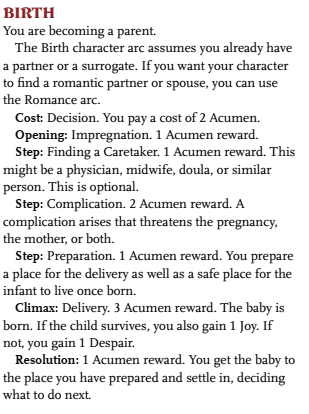
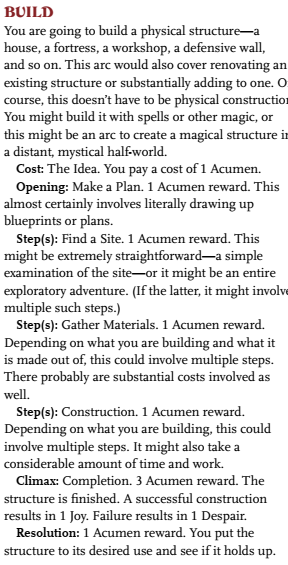
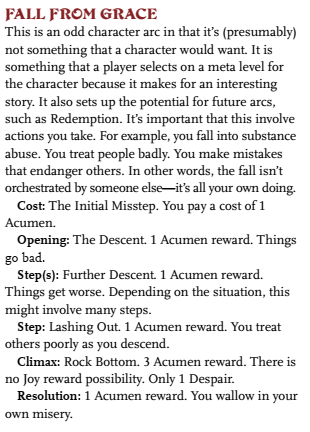
And finally some advice from Monte Cook:
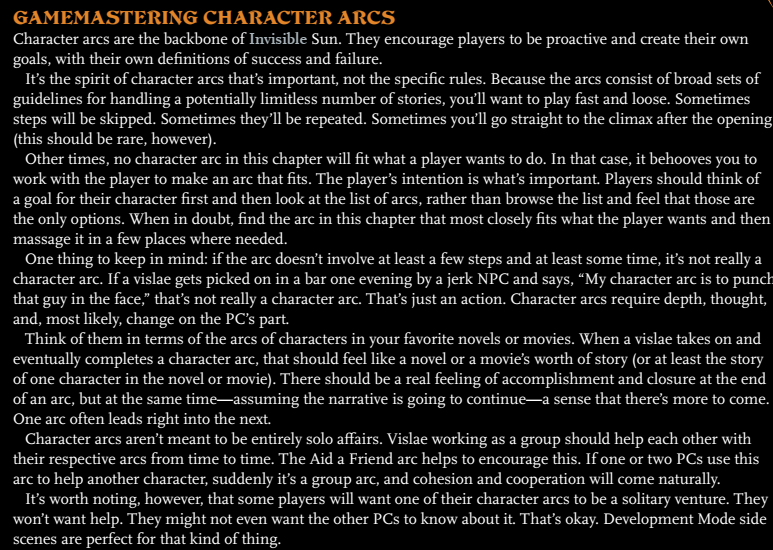
All I can say is: Bullshit. This advice works just fine for non-mechanical character development like any other RPG, but you put checklists with fixed XP rewards at each step for your game. So no, people are rewarded, incentivized to min-max their character development for XP Gains. Acumen is how you learn Skills, Spells, Class Abilities, and Secrets, most of the actual mechanical bits of your character.
Of note, I went through every character arc, and turns out? They aren’t balanced against each other at all. Mathematically speaking you want to only do the character arcs Assist an Organization, Birth, Build, Creation, Defeat a Foe, Growth, Instruction, and Master a Skill. These all give you at minimum 7 Acumen for doing them. Of note that if you’re doing one of those arcs to benefit someone you have a Bond with, you can get even more Acumen, as that adds a flat +1 Acumen per step, most of these having at minimum 6 steps.
Every other option? Gives you less than 7 Acumen for doing them. Of special note is , Finish a Great Work, Raise a Child, Repay a Debt, Restoration, Revenge, Romance, and Train a Creature, all of which give you only 4-5 Acumen minimum.
Next Time: Character Creation is DONE! Learn about Orphan Depression Fiat Currency!
Money and Goods
Original SA post
Money and Goods
Do you wanna hurt? Do you enjoy screaming violently into the sky because goddamnit how stupid can you get? Do you enjoy your faciful magical world’s entire economy being based on industrialized child-labor?
Currencies
Invisible Sun has stupid fucking money. The dumbest money possible. You will wish for copper/platinum/gold in reasonable base 10 increments of value.
The first currency is Orbs. Yes Orbs. What are they? Little marble looking things that are full of thoughts and ideas. Let’s just ignore the stupidity of orb-shaped money and how impractical and stupid it is and get into the more esoterically stpuid details.
Orbs come in four kinds: Glass, Crystal, Gem, and Trueorbs. Trueorbs is spelled like that in-book.
Glass orbs are the most common, and each is worth approximately 10 American Cents. All units of currency are given equivalent value in USD, even though they are magical money from a higher dimension. Glass orbs are made of glass and full of common ideas and thoughts of minimal value. Examples given are a taste or the thought to wear a jacket when it’s cold. They are so low value in fact you can’t make money making them. The only way they are explicitly produced are by mass child-labor: Literally kids just daydreaming and thinking in explicitly stated long days to make them. Your base economy is founded on child labor. What the FUCK. They disincorporate after 50 years.
Crystal Orbs are worth 100 Glass Orbs or 10 dollars. They’re fairly common ideas but rarer and more complex than glass orbs. Examples are a recipe or directions to a place. No mention is made of whether these are made by sweatshops full of children or not. They don’t discorporate, but they are fragile. Glass orbs are apparently NOT fragile, but crystal ones are. Why am I imagining GM’s telling you how much money you lost every time you get tripped or knocked over?
Gem orbs are 100 crystal orbs or 1000 dollars, and are rarely used. They are nigh-indestructible, permanent, and who knows what sort of ideas they have inside them because the game doesn’t say, or how they’re made.
Trueorbs are the last kind and are not fucking money. They have the same value monetarily as gem orbs, but they’re made out of solid ideas made… somehow. “The essence of the original concept of orbs from days of old” as the book says. What this means is they aren’t useful as cash because what you actually do is eat them because they’re wizard drugs. Consuming a trueorb adds 1 to your Hidden Knowledge, representing you learning whatever the idea inside was.
Orbs are a cool concept,.Wizards trading ideas and thoughts as currency, done as boring as possible. Also fucking hell why did you base your monetary standard on child-labor???
Next up we have Magecoins which are even dumber than orbs. They’re large fancy golden coins that come in two denominations: Vim and Lumins. Also they may be called mana coins because we needed two names? Anyway, magecoins can’t be traded for orbs, except they can at a rate of 1 to 1 with gem orbs because fucking hell Monte can’t you at least be firm on how your fake currency works? Orbs are used to pay for normal shit like real money, but magecoins are only traded to vislae because they’re magical money. As in they’re the money you use to buy magical items, potions, and services. It’s wizard money, separate from normal money. Also they’re wizard batteries because you and destroy one to refill one of your pools: Vims restore Certes and Lumins restore Qualia. There is no mention of how you make magecoins.
Bloodsilver is the stupidest fucking thing. It’s money that is literally cursed. The more you have the harder it is to resist the curse, which is basically random magical effects going off at you as you do stuff. Literally if you have more than 1 of them, the GM is supposed to randomly make you roll to not get fucked by some random magical thing happening to you. What do you use them for? Assassins. Literally just assassins. They have no other use and most people won’t interchange them for any other currency (worth 1 crystal orb because Commitment To A Gimmick Is Hard). In other words… I have no idea why any PC would ever touch these fucking things.
Demontears are not demon tears, but may be demonic excretions of some kind, maybe? Maybe they aren’t. It’s mysterious. They look like little red pearls, and work just like magecoins. Demons use them as money. There is no other information on them.
Bits and Bobs are random currencies from other places in the multiverse besides Indigo aka Wizard City. They’re worth 5 to an orb.
Cheques are just fuckin cheques. Issued by a bank, for orbs. It’s… it’s just cheques. Why did you have to point out that chequing is a thing?
Noosphere Exchanges just means psychics can… buy and sell things through the noosphere? Which makes no sense because orbs have value because they’re physical items. Just an idea isn’t worth money unless it’s in the physical form, so what would trading ideas in mind-space be worth? Buying… imaginary furniture?
Goods
These are items. There’s annoying dogshit tied into these, as you’d expect.
First up Kindled Items are your… not proper magical items but the boring kind that just give stat bonuses instead of doing cool shit. They are things that are “more like itself than itself” which is a stupid way of saying, they give stat bonuses. You can buy them with orbs, they’re small and minor and don’t do specific magical tricks. Just give bene or vex or armor. They don’t count as emphemera or objects of power.
Kindled items are also full of stupid wacky lore that is so quirky you guys. They’re made by awakening the spirit of the object, which gives it a form of life. This mainly manifests by… hating and wanting to devour similar objects. Kindled items will “eat” non-kindled equivalents, and if two similar kindled things are put together they literally fight to the death.
Aethyric Devices are just electronic/electrical stuff that runs on magic. Anything that would be electric runs on aethyr instead, which just means they don’t need power. They don’t need batteries, or plugs, they just have infinite power and just work. This also means they can be controlled by spirits and basically ghost-hack your magic-phone.
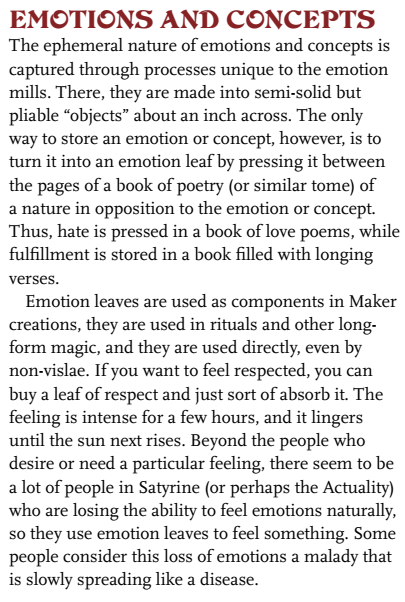
Shopping Tables
The rest of this chapter is 8 pages of shopping tables. Just tables of stuff and their costs. These tables are things like “Home Furnishings”, “Supplies and Tools”, “Clothing”, etc.
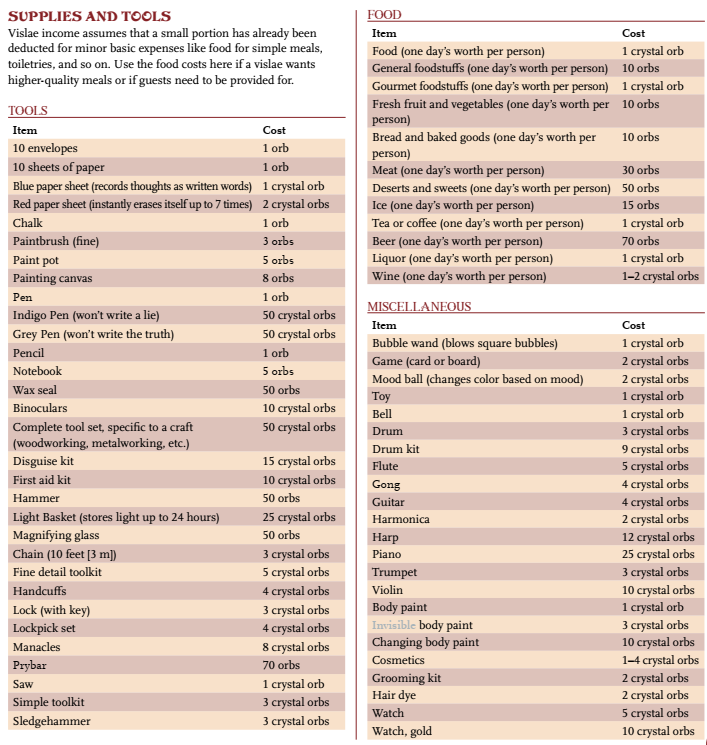
An example.
Special mention to the crafting materials, which are so uselsessly stupid it’s impressive. They essentially break down crafting by level of the material, and each level has a cost. Level 1 Material is 10 Crystal Orbs, Level 7 is 200, etc. But, they can’t just… have level and cost. No no, they have multiple entries at each level, with the same costs, for… some reason?
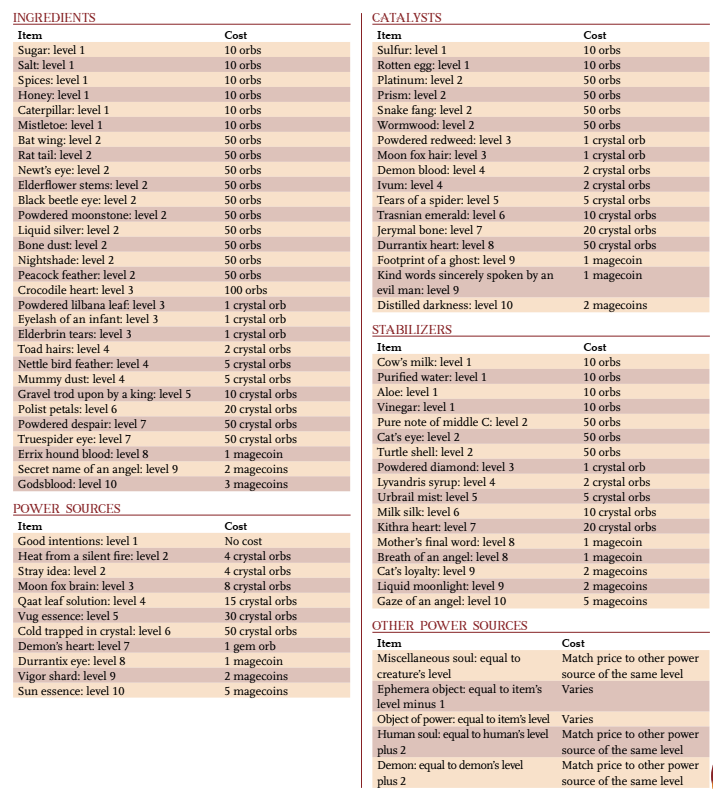
Next Time: The First Session
The First Session, Advancing Characters, and The End of The Key
Original SA post
The First Session, Advancing Characters, and The End of The Key
It’s time to wrap up this first book of Invisible Sun. So, the First Session is, still part of character creation. Yeah, it’s not finished yet. See, first session is you all get together and collaboratively… finishes the characters. Now, I am a fan of concepts like this: I think Unknown Armies 3e’s First Session campaign/character creation system is brilliant.
This is probably not going to be brilliant.
So after everyone introduces their characters BUT NOT THE SECRET SOUL. You move to step one of first session…
Neighborhood
Yep. The group collaboratively comes up with at least one neighbor for each PC, which the GM rates as Positive, Negative, or Neutral in respect to that PC. This repeats until every PC gets at least one neighbor. Then you do it again and come up with one to three nearby points of interest in the neighborhood, then one or two local problems or issues. All of those are again, rated as Positive, Negative, or Neutral.
GM then tallies up the positive and negative, ignoring the neutral things. If more positive than negative things, PC gets 1 Joy, if opposite, 1 Despair, if neutral, they get nothing. Each PC gets a Wicked Key which… one sec. I have to literally flip to the last page of the book for an explanation of what a Wicked Key is.
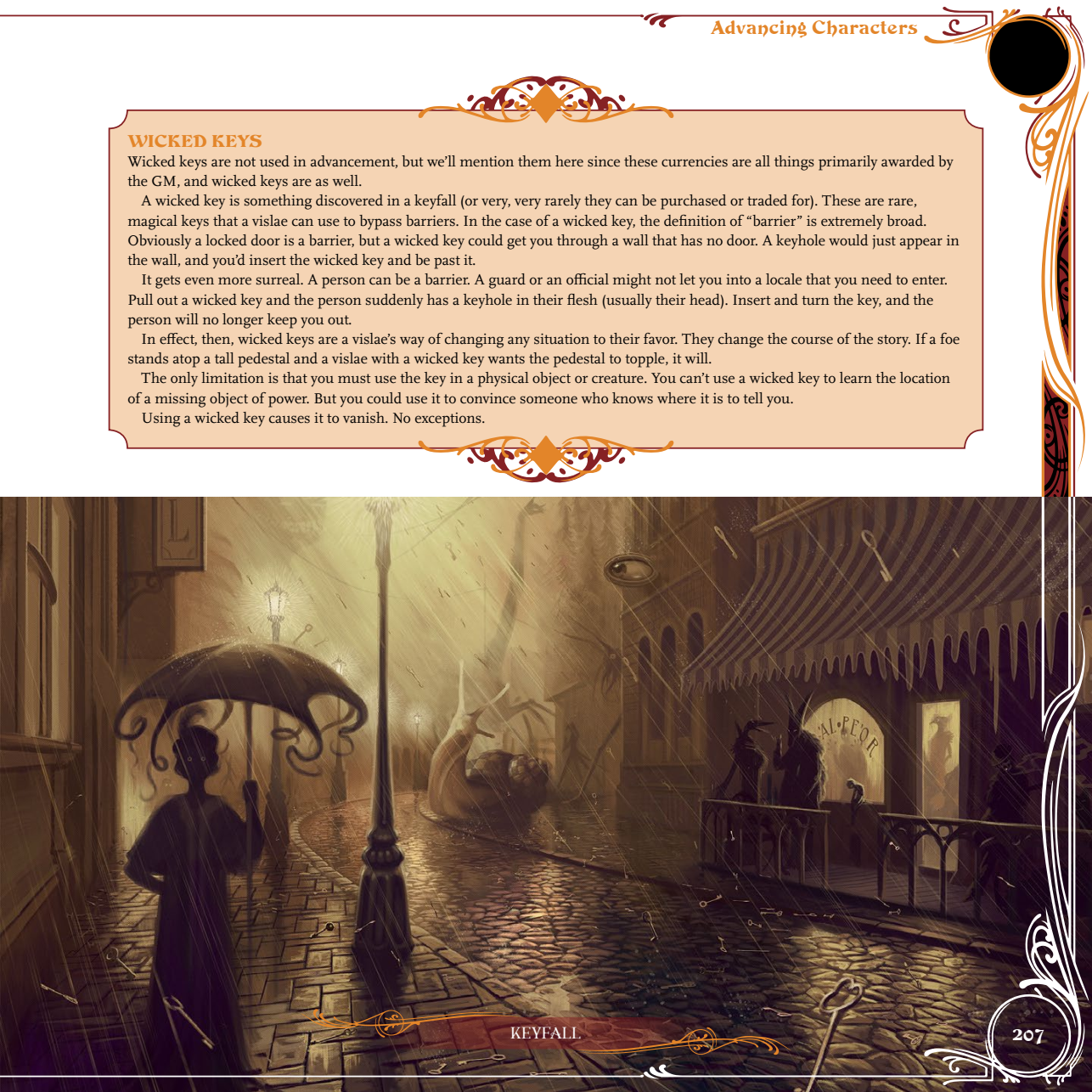
Ok while a cool concept I actually dig, why is this the last page of the book? Anyway, everyone gets a Wicked Key…
That they immediately give to another player as an award “for a suggestion that they liked or thought was particularly fun or imaginative”. Why? I can’t imagine any situation that wouldn’t result in keys just getting swapped around between people. If someone gets multiples, that means someone else gets none and that feels like a fast way to breed resentment in the group.
Most of this section is taken up with suggestions, which I will transcribe a few of because they’re either hilariously bad or hilariously useless.
-
Neighbors:
- Possibly a vampire (negative)
- Very nosy couple (negative)
- Owns a dog that barks incessantly (negative)
- Member of the same order as the PC (positive)
- Helpful (positive)
- Spider with a very large web (neutral)
Points of Interest:
- Park (neutral)
- Thah installation (law enforcers) (depends on PC)
- Flophouse (negative)
- Food Market (positive)
- One-star hotel (negative)
- Two-star hotel (neutral)
- Four-star hotel (positive)
- Five-star hotel (positive)
Local Issues:
- Vandals (negative)
- Large number of elderbrin (neutral)
- Young trouble makers (neutral)
Bonds
Then the PC’s figure out any bonds between them, ideally everyone has a bond with at least one other person. If you are familiar with various Powered by the Apocalypse games like Dungeon World, you may assume that this works the same, you’re wrong. This is Invisible Sun, these are hard mechanical definitions of human relationships. You can have one PC Bond at creation, any more you have to do the Develop a Bond character arc to get, and if you have a bond with someone, you can share character arcs.
I’m not going to go over all the bonds, but they’re as awkward as you’d expect. Fellow Students bond lets both PC’s learn a single spell up to level 3, but they can only cast that spell when they’re physically close to each other. Housemates means you both share a better house mechanically, but… one character just doesn’t get a house.
Lovers is hilarious because it’s a blanket +1 to every action as long as they’re physically close together. The drawback? They start getting stat penalties for every day they’re apart. Being in love is quantified through stat buffs and penalties. That’s the most 3rd Edition fucking thing.
Ephemera
Each character starts with your maximum number of Ephemera. These are your minor magic items, cantrips, etc. GM gets final say, and it’s probably easiest just to draw random ephemera from the Ephemera Cards because remember, this game was a giant box-o-feelies.
The Desideratum
Good god Monte, is there any term you didn’t make obtuse and confusing? Desideratum, my god.
This just means pick one of these six things that you want the game to be about : Money, Power, Information, Allies, Travel, Altruism, to give a guide for the GM in making the second session which is where you actually start playing.That’s it.
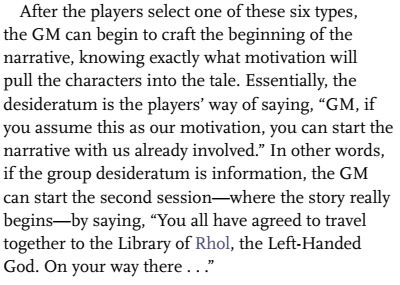
Advancing Characters
This’ll be quick because I had to explain the advancement systems beforehand anyway. So quick recap: XP in confusing. Acumen is spent on skills, spells, secrets, etc. Joy and Despair are also XP but you need one of each to make Crux, because fuck you, which is spent to advance Forte’s and Order. It’s also apparently spent to make magic items and activate certain abilities, so that’s… that’s a good idea I bet. Also… ok wait.
Joy and Despair need to be tracked even after spending… because they increase the power of your Magic Hand or Buttplug??? That’s… the first I’m hearing of this.
Wait, what is this???
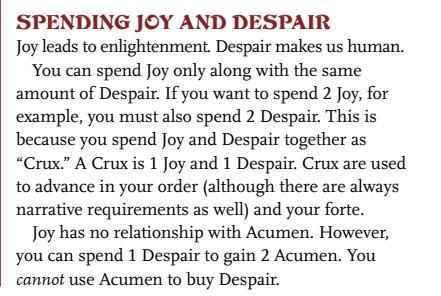
Wha… why would you mix the systems like that? Like I get the idea: Bad stuff is more valuable mechanically than Good Stuff, but this just means it’s more confusing in a game with an already overcomplicated and confusing XP system.
Whatever. I’m skipping costs to advance stuff, because who cares? It’s not insane, just like “oh 1 for level 1-4, 2 for 5-6”, etc. that sorta stuff. Instead let’s go to something… fucking stupid.
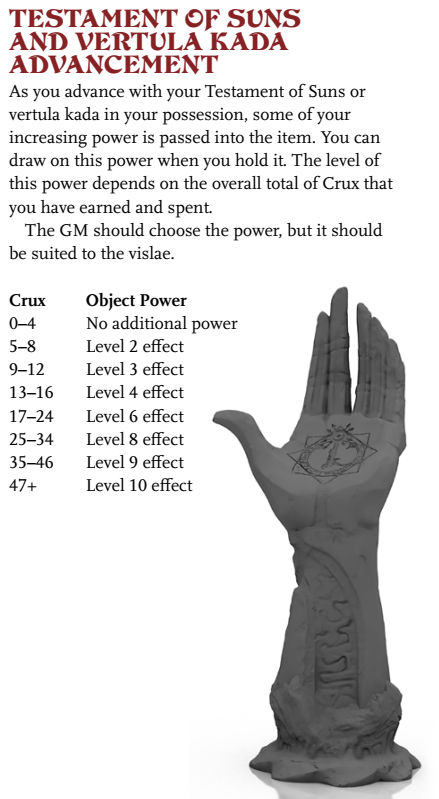
This is a good way to end it I think. Your magical whatstit of choice is an ever-increasing in power magical item. This is a cool concept. This sounds neat. Or would except… you don’t get to pick. It’s the GM. This is a permanent defining magical item that you get, and you can’t choose what it does. The GM decides. The GM Always decides.
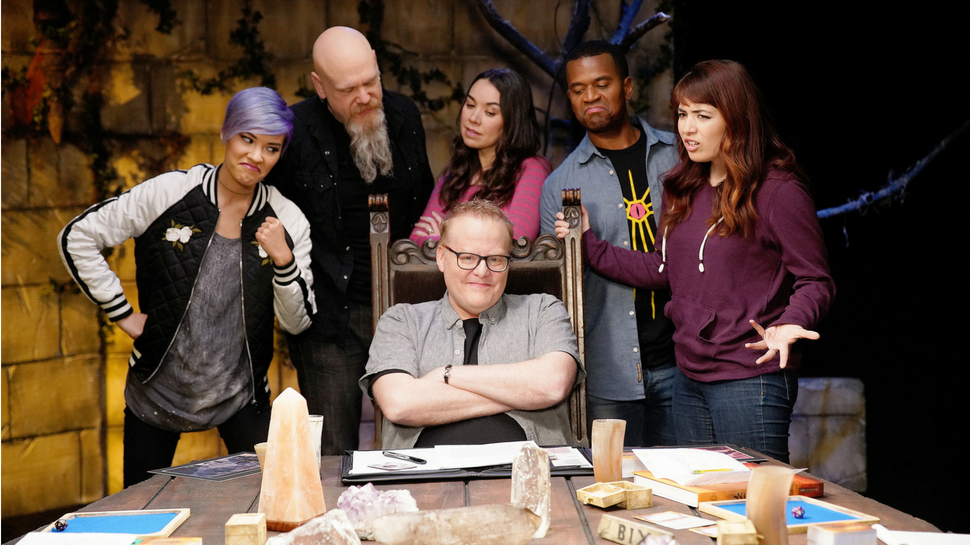
Always.
Well, this wraps up The Key. Next time: The Gate: The Actual Rules of The Game, Gamemaster Advice, and… THE SOOTH DECK!
The Gate
Original SA post
Ladies and Gentlemen. It’s time.
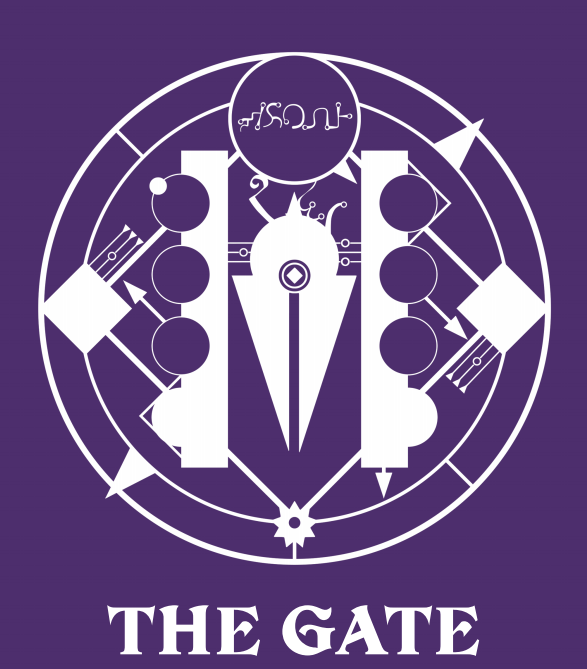
We have finished The Key. Character Creation is behind us. So now, we move on to The Gate. Which is Rules, GM Advice… and The Sooth Deck. God help us all. I’m going to be blitzing through this because as you well know, if there’s one thing more boring than watching oatmeal dry on an institutional white wall, it’s Monte Cook’s mechanics.
Gameplay
This is in fact where we start, after a short paragraph on what Narrative is that is totally unobjectionable. The game as a whole is perfectly fine on the writing end, and has a good grasp of WHAT it’s doing. The issue is just what it’s doing has no reason to be as well executed as it is. Most of this chapter is pretty standard and not very interesting GMing and play advice. How to know when to switch between Narrative and Action Modes in scenes, how to award XP at the end of a session, how to set up and prep for a session, how to handle missing players, etc.
Some quick terminology is the Modes. You got Action Mode which is your basic initiative turn based stuff. Narrative Mode is what they call the non turn-tracked stuff, etc. Basic restatements of standard RPG mechanics.
The weird part comes in Development Mode. Which… I’d almost say is a good idea, in fact it’s a really cool idea! It’s just ruined by clunky execution and a baffling decision to tie it into both The App (Yes, Invisible Sun has an app. It is literally just a chat program and cannot be used for any purposes DURING a session) and the Fucking Sooth Deck. The App is dumb, but also totally extraneous EXCEPT it isn’t because of the Sooth Deck. We’ll get the THAT but resolution of anything in Development Mode is supposed to be done by drawing a Sooth Card which is awful and we’ll see why much later when I cover that entire nightmare mechanic in its entirety.
Development Mode is basically play between sessions. It’s supposed to let players have solo scenes, do character development, and take care of actions that are not necessarily interesting or important enough to do during live-session-play. It’s a Play-By-Post thing integrated into the rules. This chapter is mostly advice about how to handle it, and it’s actually good! Monte Cook is garbage at game design and setting but he legit does have good GM advice and isn’t a terrible grognard. It’s pretty consistently a thing he’s gotten very good at, just giving practical useful GM and Player advice. Good Job Monte, it’s nothing revolutionary but Competent and Inoffensive is a hell of a high bar to pass in this hobby.
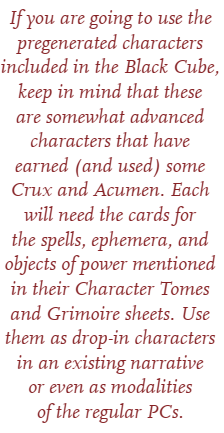
Actions
And here we go. This is the meat of actually rolling. I won't cover everything as I explained a lot back in the last book but some observations:
- Dice are D10’s, but no 10’s, it’s read and handled as 0-9.
- ’’Between these two states is a range of numbers, normally 1 to 10. This is called the challenge. (Great skill or magic can broaden the scale to 1 to 13, or even 1 to 17, effectively pushing “impossible” farther and farther off, as advantages make more of the impossible possible.)’’ This is a really confusing paragraph. What it actually means is… Challenge goes up to 17, but everything is split into tiers. 1-10 is Normal Person, 11-13 is Skilled People Only, and 14-17 is Magic Only. Why does it end at 17 instead of 20? Math-wonks feel free to tell me. It feels like an awkward number so there must be some reason to cut it off at 17. The thing I see being an issue is the 11-13, because that’s just fodder for arguing about what is possible for a highly-skilled person to do and is just sort of too wishy-washy for GM’s. Ok no wait, later on we do get a clear reason why it’s 17! Is it based on the presumed “maximum” Venture you can get? Or any maths at all? No. ``The number 17 is the very limit of the suns, the final number of the Nightside Path, and the number of known suns (8) plus the number of actual suns (9). Among other things, it is the number of immortality and divinity `` Yes, difficulty scale is limited by Fake Numerology.
- Challenge is also the same as level. So NPC Level, level of an obstacle, level of a spell, etc. are all the same thing as Challenge. Sometimes. Sometimes there are specific situations that will increase the Challenge. Nothing decreases Challenge, that just adds to Venture.
- As a corollary to that, OOPS, Cook does in fact give us an objective measure of challenge in the example of a long-jump. Mainly, the Challenge of a Long Jump is 1 Challenge per foot jumped. So 3 Foot Jump is a Challenge 3. This sounds good except Olympic Long Jumpers regularly leap more than 20 feet. Which means they are making jumps literally impossible even with magic. Oh wait, no sorry you… don’t use real world logic. I’m just going to quote this:
So, go with what feels right in your belly guts I guess???quote:
For example, attempting a standing long jump across a gap of 1 foot is challenge 1. A standing long jump of 10 feet is challenge 10. But a typical person can’t leap farther than 6 or 7 feet under normal circumstances. Does that mean that each foot of distance equals +1 to the challenge? Seems close enough to say yes.
And in fact, it’s that “close enough” that GMs would do well to remember. Don’t agonize over challenges. Set a number and keep the game moving. Rating something on a scale of 1 to 10 is something we’re all fairly used to doing.
If a character is trying to swim in a raging river, you might think, “Well, that’s a very tough swim, but I can imagine even harder swims (swimming in a tidal wave, perhaps), so I’ll call it challenge 7.”
Later, the same character is swimming in a pool with a strong current. Not routine, but not as hard as in that river. So you rate it challenge 5.
That’s all there is to it.
- Magic=Multiple Dice and Multiple Successes. A Challenge against.. Magic? Something involving magic? Magical opposition? Needs Magic to counteract it and that means using magic to get Multiple Dice. If you roll a 0 on one of those extra dice from a spell or ability or Sortiledge you get Flux which is your Random Bullshit Magic Things and Miscast effects and such. More die you get a 0 on, the worse the Flux up to a max of 3 0’s, which can literally just straight kill you instantly. So… more difficult Challenges may need multiple successes and therefore multiple dice and therefore a higher chance of instant magical fuck-yous.
OK dumping the random thoughts to dig into something meatier:
Using Bene For Effect
Ok so, in addition to spending Bene to bump up your Venture (Your positive modifier to your die roll) you can also spend it instead to modify the results of a successful action. Amazingly, this invokes one of our favorite things! Mandatory “Optional” Abilities! See, there are 4 levels of Effect you can get by spending Bene, but by default you only get level 1 access. Want to be able to spend more to get higher effects? Gotta have the Expansive Endeavor secret (Feat).
What are these effects? Nothing interesting at all, but stupidly designed because certain effects are locked into higher levels for no logical reason.
Level 1: Do +2 Damage, get +1 Venture to social interactions with a character of your choice who knows about your action, +2 to… the same action in the next round, and… nothing. Literally: ‘’Just simply excel: Although there’s no mechanical effect, you succeed at the action with flourish, speed, grace, and aplomb.’’ So we got two semi useful universal things, one that is… just weird, and one that is literally Spend this mechanical resource for no benefit at all. You may say “but narrative advantages are valid rewards for…” no they aren’t EVERYTHING in this game has hard math behind it, it’s literally useless.
Level 2: Another character nearby gets a +1 to their next action, you narratively change the environment in some way, you move farther when doing an action that moves you, you can do a precision called strike to an enemies specific bodypart, you do +4 damage, you knock a character to the ground. So, this tier requires a secret (feat) to access and… only 2 things have mechanical effects. The inspire one character to give them a +1 and the inflict more damage ones are it. None of the others have any actual mechanical effect, it’s all narrative. How far do you move more? Up to the GM to make up, no guidelines or rules. What does a precision strike do? Who knows, ask the GM they have to make it up. Change the environment? Depends. No mechanics.
Level 3: Move AND act. That’s literally a thing you have to spend 3 bene and get a secret (feat) to do, is MOVE and ALSO DO ANOTHER THING. The typical Move and Standard actions require you to spend 3 bene. AS WRITTEN YOU CANNOT BOTH MOVE AND DO ANYTHING ELSE. That’s amazing. The actual action rules just say “anything you can justify as a “single action” or doing one specific thing” but that means that Monte Cook never assumed your magical dimension hopping wizards could both walk AND do magic at the same time. Oh the other stuff is a group version of the Inspire one, give enemies a -1, do +6 damage, group impress, and make a single character lose their next action.
EDIT: I have reread and realized I was incorrect: you can move and perform an action, or move AS an action to move longer distances. The Move and Act is poorly named and merely lets you make ANOTHER move after your action. Also the layout of this book is hot garbage and I literally missed the rules for movement with my eyes.
Level 4: Gain information, either a weakness of an enemy or a secret of another person you’re talking to, something like that. Vague and not a mechanic. -2 ongoing penalty to an enemy via an attack, scare one character into… doing something the GM decides but it’s should be run away or surrender or something but no hard rules sorry! Or +8 damage.
OK the rest of the chapter is pretty much nothing interesting. NPC’s don’t roll, just provide difficulty for PCs, Damage is fixed based on weapon/spell, defenses are rolled by PCs, etc. A mostly dry and not that interesting chapter with a few MAJOR DOOZIES of stupid design.
Next Time: Advanced Rules Modules, Oh God More Shit to Buy With XP Not In The Character Book Why
Appurtenances
Original SA post
I’m back baby! Again! This time lean, mean and cutting out garbage nobody cares about like “resolution” and sticking to the good shit like insane subsystems and stupid setting lore!
Speaking of stupid setting lore:

You jaadi?
Appurtenances
Appurtenance is a smug dickheads way of saying “Accessories”. Not in universe, like Appurtenance just means Accessory. There is no reason to use it.
So anyway these are character things that aren’t in the character book that you can unlock by spending Crux, which remember, is one of the XP types. You can only have one. These are essentially incredibly dull prestige classes. The benefits aren’t bad, but they are boring as hell. I’m not going over all of them, just the interesting or spectacularly offensive ones.
Allied with Angels
You’ve got a guardian angel. Angel not actually included. It gives you two powers, Foresight and Protection. Protection is just a Get Out Of Death Free Card that you get once in the game. Foresight is supposed to be precognition but it’s the most boring form where you don’t get any actual foresight but just get bonus Bene in your non Sorcery pools. It’s just a buff fluffed as foresight but not actually providing any foresight at all. This one gets a gold star for being typical: It’s as disappointing as you can imagine and nowhere near as cool as being buddies with the Heavenly Host should be.
In League With Demons
Oh god. OK so this is explicitly worse than the Angels one in every way. In fact it’s hilariously terrible.
So you made a pact with Satan. This gives you one benefit: when you get down to 1 Wound from death, two level 7 demon warriors appear to protect your life. This also causes 2 Anguish (Mental Wounds), and gives you 1 scourge (negative modifier) to all your pools (stats). That Scourge lasts until you sacrifice another living thing to send their soul to Hell to pay your debt. The debt stacks up to 3 times: get the benefit stacked 3 times and Satan eats your soul on the next sunrise.
Now, I will give it credit. It’s interesting and flavorful! Like, this is a cool concept for a power that causes adventures! It’s also horribly designed. First obvious issue: You can get Wounds from things that demon bodyguards can’t help with. Combat or enemy attack? Sure. Poison? Disease? Wasting curses? Completely useless, but it still triggers and gives you the stat penalties even if it literally does nothing helpful. You get a soul debt because you got real bad Wizard Pneumonia? Too bad fuck you.
The getting Anguish can kill you. You can get saved by demonic bodyguards, but kick the bucket the same instant through a heart attack, or just getting too sad to keep living, or something. Once again: It can literally kill you while trying to save your life which it might not do anyway
Also it just… happens whenever you hit 1 Wound from death. Fights over? Too bad, it triggers, fuck you. While flavorful for a demonic pact… it’s not fun as a thing you have to spend XP to get and locks you out of every other Appurtenance
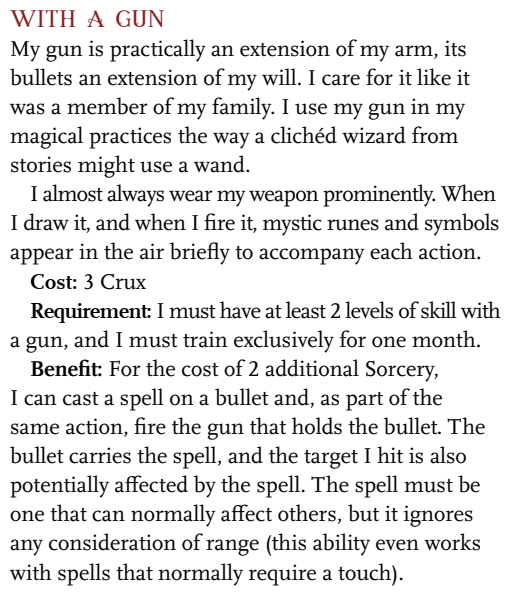
Not hating on this one: I legit think it’s cool and good. Like, this is a good thing. It's flavorful, useful, and a cool unique gimmick to be the Gun Wizard in the party. I Like This. Good on you Monte.
There are 12 of these. Of the ones that are interesting or at least like… fun? 3. With a Gun is one, the others are With a Beast which gives you a Familiar/Animal companion, and With Blood, which just lets you convert lost HP 1 to 1 to Sorcery points you can spend on your next action. 3 of 12 aren’t terrible or dull.
Misc. Other Stuff
There’s lots of terrible rule things that are boring and not worth going in depth on but I’ll highlight them in case people wanna know more.
You can change your order or Forte! Changing Forte is really good. You get to keep all the stuff you’ve already gotten and get to start a new one, so there’s no penalty to min-maxing by skipping through Forte’s only getting the abilities you care about. Unless the GM stops you of course, but as written this is fine. Changing Orders will make your GM want to kill you. You keep your old stuff, but your new things are always at -1 until you progress in your new order up to where they were in the old. I can’t even begin to contemplate how horrifically complicated and insane it would be to have access to multiple orders worth of powers. I cannot see any GM who realizes how terrible this is allowing it to ever happen.
Patrons are a thing: Pact with magical being of higher order, you do a thing for them and get benefits. It’s shitty because they only detail a handful of sample patrons and have no guidelines for making them up.
Modalities are NPC copies of your PC that live entirely separate lives and you don’t know about each other. It’s a natural consequence of doing Magic Shit. Most games would just make this a concept that would be fodder for adventures, meeting your NPC clone while adventuring and such, but Invisible Sun has entire detailed advice about how to make and stat and level them up because they’re clones of a PC, they have a full PC character sheet.
Shadow Characters suck and only idiots play them. They have no magic at all. They only have skills. Static bonuses. There is literally no reason to play them and I don’t know why they had to include rules for it.
Next Time: Gamemastering